#there are other instances of her working with others as well the list is Extensive
Text
Homewarming Analysis: Eddie
There are LARGE sections of info in the latest Welcome Home update, but none as strikingly out of place as the last clip in the compilation on awayfrompryingeyes. And what a coincidence! I like discussing puppet trauma.
First thing to note- Poppy is noticeably just gone from the Homewarming celebration. This is especially weird seeing as she was still included by name in the Cookbook, appeared in one of the technical difficulty segments, and was also on Eddie's delivery list for Homewarming. Hell, the narrator of the holiday special insists that everyone had joined in for the festivities.
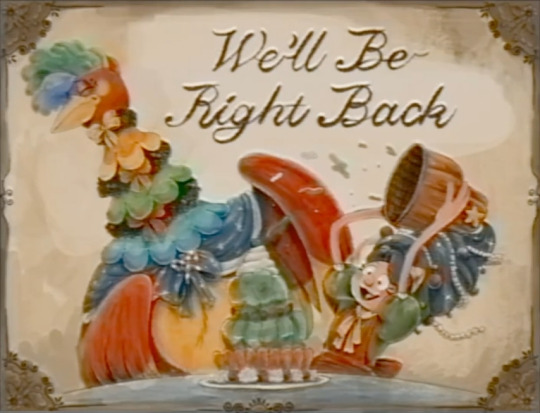
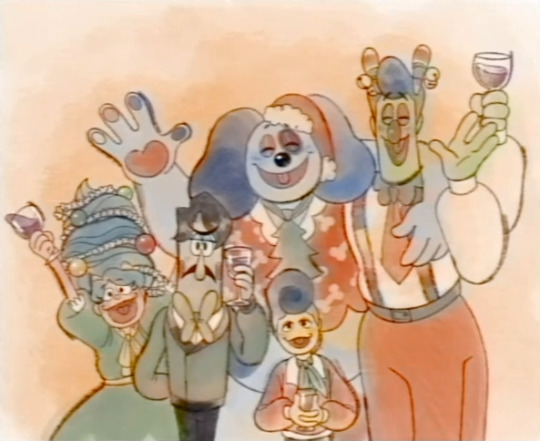
Yet nobody else seems to notice her absence. More on this later.
In between the other commercials, there are several live-action instances of Eddie showing frustration at the fact that nobody has contacted him all day, and that there are no packages to be delivered.
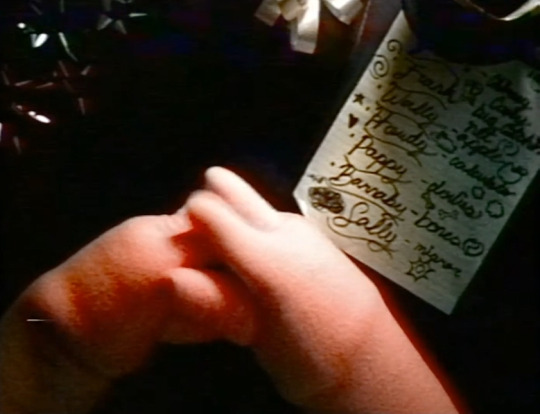
At the beginning of the holiday special, Sally explains to him pretty breezily that everyone helped out with deliveries so Eddie wouldn't have to do it, meaning he has the day off for Homewarming.
I do think the Neighbors had all the best intentions by trying to surprise him, but unintentionally crafted a pretty perfect hell for Eddie.





There are some recurring themes in Eddie's "about" section- overall forgetfulness, his dedication to his job and by extension his reliability in that regard, the fact that he's often up and about (usually around the Neighbors), and that he works hard.
So not being contacted, not having anything to do for most of the day, and not even seeing anyone walking by outside VERY understandably drives him crazy! And for someone with memory issues already, having a huge disruption like that in an otherwise pretty standard routine has got to be not only jarring, but downright scary as well!

After Sally brings him in for Homewarming and he gets settled in, the narrator insists that Eddie was indeed happy like the rest of the cast. We quickly see this isn't the case. Instead, he seems to be having some kind of derealization, which is shown via live-action shots spliced in with the normal 2D animation.
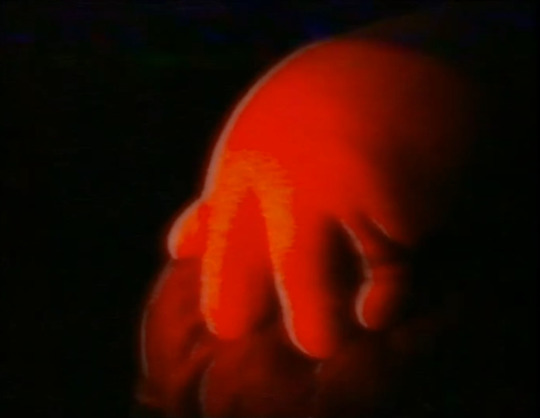
While Eddie is in crisis, Home is the only other character in frame. Everything else is either extremely dark, or a random sequence of shots. Home stares down at him the whole time, and the whole time Eddie is incredibly aware of this.

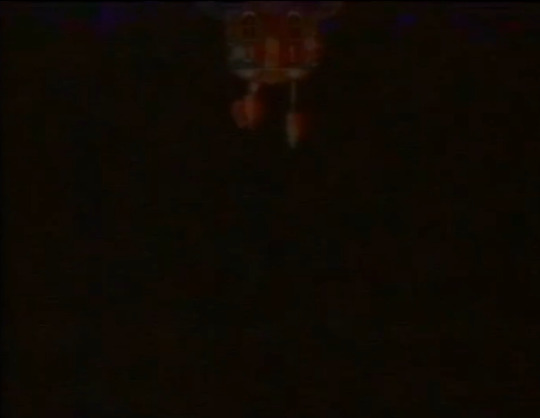
There are quite a few abstract shots that either come off as something burning or melting- an ornament dripping yellow liquid onto the floor, a red screen with subtle changes in the lighting and shadows, a live-action shot in a red-lit room with a moving shadow, Eddie sweating profusely (possibly crying), and an actual candle burning and melting.

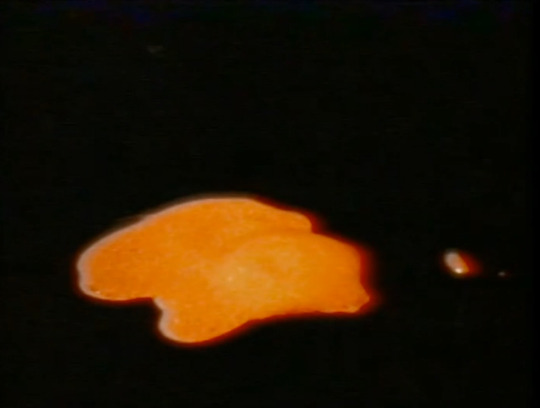

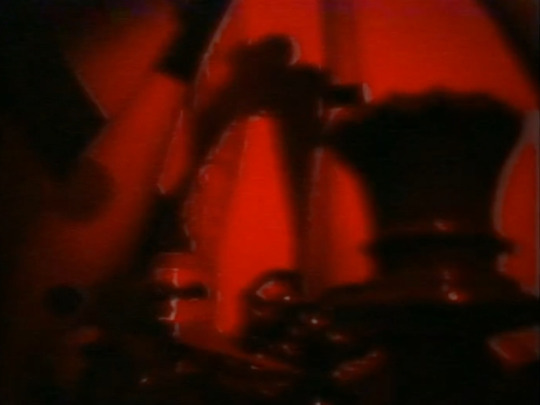


I don't think the derealization scene is meant to only encompass one thing. Eddie is becoming aware of his surroundings and realizing that the world he lives in isn't exactly real, and Home is scaring the shit out of him. But I don't see a lot of people touching on the fact that this could represent burnout as well.
Eddie is often held up on a pedestal as the hardest working neighbor, the one who likes to help problem solve and the one who physically takes on heavy loads. It was shown between commercials that when he's not fulfilling his normal duties, he literally doesn't know what to do with himself. His passion for his job and his fellow Neighbors is a strength, but if he's been inadvertently neglecting himself, then he's pretty susceptible, maybe even blind, to the fact that he's burnt out. And unfortunately, I think burnout is hitting him in tandem with other things. Home seems to be fully aware of the fact that Eddie is starting to crack, and judging by that stare, I don't think it's going to be handing out mental health services any time soon.
Eddie starts to come back (albeit in a bit of a confused haze), and there are only two characters in front of him- Sally and Frank.
Their two opening lines in the conversation really summarize the difference in their awareness to Eddie's distress.

Frank immediately opens with "this bitch told me you've been doing too much, what's that about?" and Sally responds with "yeah it's not easy being the hottest bitch in town </3"
Okay, maybe not exactly that. You get my point- Frank is immediately sus, Sally isn't.
It isn't until after Sally leaves that Frank tries to get through to him more insistently, and after some coaxing, Eddie seems to start coming back with more clarity of his surroundings.


Also noteworthy that despite still being a little out of it, he can see Frank pretty clearly when he leans down.
Now, the logical part of me says that he's closer with Frank than the others, therefore he might act as sort of an "anchor" when his mental state starts spiraling.
The sappy part of me says that Eddie tends to remember things he's passionate about better. AKA his job, AKA Frank.
Anyway, I mentioned Poppy earlier, and there was a point to that.
We've seen how Eddie's memory can be dodgy at times. He was already in crisis when he arrived to Homewarming, and then he immediately had to go home.
And again, let's not forget that Poppy was cited to have been at Homewarming, and by all other accounts seems to have been included to some degree, even if not front and center.
Maybe she was actually there.
Maybe Eddie just forgot.
#either that or poppy's dead both are plausible tbh#welcome home arg#welcome home puppet show#eddie dear#archer writes
30 notes
·
View notes
Text
.a court of ash and smoke | eighteen.

pairing: lucien vanseera x fem!reader
summary: five years before feyre archeron ever stepped foot in prythian, another human girl found herself in the spring court. but the trials and tribulations of her time under the mountain left her with nothing but a certain red-headed high fae emissary, who had once resented her entire presence, to help and guide her.
chapter warnings: n/a
chapter word count: 2242
🩸 series masterlist 🩸
please remember to reblog, like, and share a comment if you enjoy this series - it is always appreciated by writers to see their hard work valued.
🩸 tip jar 🩸 🩸 tag list 🩸
Rejection

The evening seemed to drag. Dinner was spent with Helion and Clyro, numerous jokes told that you didn’t understand, and you ended up spending most of the dinner cradling a glass of fruity white wine. Lucien nor Silas or the other sentinel made an appearance for dinner. You only picked at the food that Helion served you, having little appetite after your conversation with him that morning. Your mind was racing, always falling back to the dark magic that was lingering in your blood. You should have known, you had suspected but prayed it wasn’t true. Now you knew for certain, and it uneased you.
“You shouldn’t fear it, you know,” Clyro said as he escorted you back down to your chambers. “Lord Helion is right when he says that it can be used for more than just evil.”
“What makes you think that I can control it?” You asked quietly. “What is to stop me from doing…awful things if it takes over?”
Clyro stopped and looked down at you. “I know what you fear, but you are not like Amarantha.”
“How did you know that’s what I was scared of?” You asked, blinking up at him. He smiled.
“I have been working closely with Lord Helion for many decades, and have learnt a great many things,” he said with a slight mischievous smile, turning to continue the walk back to your chambers. “For instance, I know that your own High Lord is struggling since your return Under the Mountain, I know that both of the made Faes have great futures ahead of them should they choose to accept it, and I know that the emissary of the Spring Court has more that just fire in his veins.”
You found yourself outside the door to your chambers, and you turned back to Clyro slowly, brows furrowed. “You said that ‘the made Faes have great futures ahead, should they choose to accept it’,” you repeated slowly. “Is that me? Am I a made Fae?”
“Well, you were made, were you not?” He said with a small smile.
“So, what do I need to do to accept that future?” You asked hopefully, but Clyro chuckled.
“I may be very old but I do not have all of the answers,” he chuckled. You let out a small, disappointed sigh. “Seek out the High Lord. He has the answers.”
As he bowed his head and turned to leave you had no doubt which High Lord he was referring to: Rhysand.
Later that evening you found yourself curled up on the couch with a book from the extensive bookcase in your room; it was filled with stories from the war, not exactly a friendly bedtime story, but it kept you distracted and gave you something to do. Despite that, every few pages, the words blurred together and faded out as your mind turned back to everything you had learnt that day. Lucien and the mysterious Jesminda, a hopeful future if you found a way to accept it, Lucien has more than just fire in his veins, whatever that means, and of course the fact that you were harbouring dark magic that may very possibly be the thing that kills you.
“‘The Battle of Jurian: An Extensive Insight’,” Lucien’s long-drawn out drawl read. As you glanced over the top of the book you caught him with his head cocked to the side, reading the title from the spine. “I didn’t take you for a historian.”
“I’m not,” you shrugged. “But everyone was asleep and I was bored.”
“Well, we can’t have that, can we?” He chuckled, throwing himself onto the couch beside you and resting his head on the back of the seat. “These Day Court beds are even more comfortable than the ones back in the Spring Court.”
“Ah, so that’s why you slept for so long,” you chuckled. “I was beginning to wonder if you had gone back and left me behind.”
Lucien’s jaw dropped, and he slammed a hand to his chest in mock insult as he lolled his head to the side to look at you. “I would never,” he laughed, eliciting a small giggle from you. “Although, I wouldn’t mind staying here, in truth. It is beautiful.”
“It really is,” you agreed. “Is this the most beautiful court you’ve been to? Because I think it would win.”
“The Day Court is rather beautiful,” he smiled. “But I think it’s home that’s really the most beautiful of all of them.”
You pursed your lips. “The Spring Court is beautiful, but I don’t think it could beat the sheer elegance of here.”
“Oh, don’t get me wrong,” he said with a small smile. “I wasn’t talking about the Spring Court. That may be where I reside, but it isn’t home, not really.”
“The Autumn Court?” You asked, as Lucien leaned forward and pulled the lid off the tray of food left for him on the table. “Is it really that beautiful?”
“Much more beautiful than here,” he smirked. “Not my family, but the place is breathtaking. It’s home, you know?”
“I would like to go there one day,” you mused, leaning back in your chair.
“And I would like to take you,” he said with a small smile, breaking a roll of bread in two. “One day, I’ll take you to all of the courts in Prythian. We have an eternity for that.”
“An eternity,” you said quietly. “A whole eternity travelling around Prythian. I think I would like that.”
“I’m sure you would,” he chuckled, then turned to look at you with a frown. “Are you not hungry?”
“I already ate with Helion,” you explained, and Lucien hissed through his teeth. “What?”
“I’m just sorry I left you alone with Helion,” he chuckled.
“We weren’t alone - Clyro was there too,” you giggled.
“Believe me,” he countered, leaning back in his seat so he was beside you. “I wouldn’t trust Helion to even be in the same room with you, let alone with only Clyro as a chaperone.”
As his head drooped to the side slightly from tiredness, you reached up and stroked a hand over his hair, allowing his head to fall onto your shoulder. He closed his eyes and smiled softly. “Oh? And why is that?”
“Besides Tamlin,” he murmured gently, although you did notice a grimace when he said the name. “I wouldn’t want you to be alone with any man.”
You winced - was that because he wanted you to himself? Or simply because of what your position had been Under the Mountain? You cleared your throat, pushing away the flush that threatened to blanket your cheeks. “Would that be a hint of jealousy I hear?”
“Would I have something to be jealous of?” He asked, voice smooth like butter, almost purring under your fingers as you trailed them through his hair, his rejection and the pain that you had felt afterward forgotten in that moment. “You are quite the beauty, you know. I wouldn’t be surprised if we returned to the Spring Court to find a line of suitors out the door just waiting to court you.”
“Court me?” You laughed. “I’ve never been courted before in my life.”
“Well then, those mortal men are fools,” he chuckled, eyes still closed, head nestling closer to you. “And those suitors are more than lucky.”
“What would you say if I said I didn’t want any of those suitors?” You asked slyly. Lucien’s golden eye snapped open and narrowed as he looked up at you, but you didn’t stop your ministrations on his hair for even a second.
“I would say you’re a fool,” he said, voice a little sterner. “Tarquin of the Summer Court is quite the catch, and has plenty of cousins of noble birth that still aren’t wed if he is not to your taste. And Kallias of the Winter Court has a younger brother who would make a more than suitable match for you I think.”
“But I don’t want Tarquin, or his cousins, or Kallias’ younger brother,” you murmured, looking down at him.
He scanned your face, and you knew that he was aware of what you were referring to. The smirk that had been playing on his lips vanished, and instead those lips curled downward. “We talked about this.”
You retrieved your hand from his hair in a second. “No, Lucien. You talked about it. You didn’t give me very much of a choice.”
He groaned in frustration and sat up as you moved away from him. “I told you, it wouldn’t be fair to you.”
“And who are you to decide what’s fair for me?” You snapped, your eyes meeting his. There was no anger there, however, none of that fire behind his russet eye, only guilt, and sympathy, and…pity. You could feel the anger in your own eyes though, feel that hurt and pain once more.
“Like I said,” he sighed. “There is a lot about my past that you don’t know. I cannot give you what you’re looking for. If you were with me, you would spend your life looking over your shoulder. I cannot love you, and marry you, or give you a family, or a good life, and those are all things that you deserve.”
“What makes you think I want those things with you?” You hissed, the anger taking over. “Perhaps I simply want some fun. Have you ever thought of that?”
He blinked back at you in surprise. “Is that what you want?” His voice was quiet, and the silence in the room was heavy and threatening. Because that question was weighted, and you knew that no matter your answer, it would change everything. You didn’t dare look at him, didn’t dare meet that gaze for fear he would see your words for what they were; a lie fueled by rage.
“I do not love you, Lucien,” you answered. You didn’t know if that was a lie. You didn’t know what you felt for him - you’d had so little time since leaving that mountain to wrap your head around it. What you were sure of was that you didn’t just want fun, not with him. Yet, you continued, “I do not expect a marriage proposal from you. But I do want you.”
“Y/N-”
“Spending my nights with you would be better than spending them alone.” It was a whisper - a whimper - and it told Lucien everything he needed to know. He reached forward, placing a comforting hand on your elbow.
“If I hadn’t known before that using me as a distraction was not what you need right now,” he said carefully. “Then I know now.”
You tried to hide the hurt, but tears were forming in your eyes, and you couldn’t seem to fight them back no matter how hard you tried. “Is this about Ianthe?”
“Ianthe?” He all-but sputtered out in surprise. “Why would you think this has anything to do with Ianthe?”
“I saw the way you were looking at her,” you stuttered through sobs. “I understand; she’s beautiful, but-”
“I was staring at her because I hate her,” Lucien explained, drawing out the words as if for emphasis. “I met her many years ago, when I was still living at the Autumn Court, at a party that Tamlin had thrown in the Spring Court. She wanted me to…take her to bed, and wouldn’t take no for an answer. I had to leave the party eventually.”
“Really?” You asked in surprise. “I knew I should hate her.”
“You really thought I wanted to bed Ianthe?” He snorted.
“Well, there has to be something,” you mumbled. “There has to be a reason that you don’t want me. I see the way you look at me. I know what this feeling is between us, it’s real. I’m sure it’s not just in my head.”
He sighed. “It’s not just in your head.”
“Then what is it? Because I don’t believe it’s because you were a bad person in the past, I can’t believe that,” you said. “Is this about Jesminda?”
He recoiled quickly as if you had hurt him, his face pale and void of colour, mouth agape as he stared at you in shock. “How did you hear that name?”
“Someone mentioned it to me…at the Spring Court,” you lied. “But you didn’t answer my question.”
He ran an almost trembling hand through his hair. “I don’t even know how to explain her to you.”
You drew in a shaking breath. “It’s ok, Lucien. I understand,” you said, his words enough of an explanation. You didn’t want to hear the words, didn’t want to hear that he already had a lover, or even worse, that she was his mate. You blinked back the tears. “If you love her, you should go to her.”
He winced, reaching out a hand as if to catch your tears, but you jerked away, rising to your feet and rushing to your room without looking back. Because it wasn’t ok, not really. Because what you felt for Lucien was more than just simple fun. Because you couldn’t stop the crack that nestled itself into your heart when you saw his expression as you mentioned Jesminda.
You huffed out a sob, but movement in the darkness of your room caught your eye and you froze. There was someone there, by the window. They took a step forward into the moonlight.
“Hello, darling Y/N.”

#ACOTAR#ACOTAR fanfiction#ACOTAR fanfic#Lucien Vanserra#Lucien#Lucien ACOTAR#Lucien Vanserra fanfiction#Lucien Vanserra fanfic#Lucien fanfiction#Lucien fanfic#Lucien x reader#Lucien Vanserra x reader#Lucien x you#Lucien Vanserra x you#Lucien x y/n#lucien vanserra x y/n#rhysand#feyre#tamlin#elain#nesta#cassian#mor#azriel#amren#amarantha#a court of thorns and roses#a court of mist and fury#a court of wings and ruin#a court of frost and starlight
68 notes
·
View notes
Text
Zen & Rika are Trapped in The MM World Part 1
I’m splitting this into 2 parts because it would just be too long. This is sort of a continuation of my “Zen is A Prince From Grass” theory and “Saeran/Ray created Another Story” posts. In one of them, I suggested the possibility that Zen is a bunny prince who is trapped in the Mystic Messenger world. In the other, I do talk about Saeran, but I added a follow-up delving into Rika, Saeyoung, and V and how Rika is trapped in the MM world, too.
In this post, I will focus mainly on establishing background information.
Pocket Universes/Dimensions
First, I have to establish that I believe that the world of MM is a pocket universe. Basically, it's a new universe completely different from a real universe. For example, characters from Nameless and Dandelion all live in a real universe. Dandelion is where the term ‘pocket universe’ first comes up in the franchise, and refers to a new universe created by The Wizard by using a large amount of his power. He did this because he wanted to be with a woman named Heejung, but couldn’t descend to Earth because he couldn’t leave his dimension. So, he created a pocket universe where he can enter it and brought Heejung along.

So, why do I think MM is a pocket universe? Well, basically pocket universes don’t operate under the same rules as a real universe. See the example I gave above with The Wizard and Heejung. In a real universe, The Wizard couldn’t physically be in her presence. In this pocket universe, it's different. Because he made it and probably established the laws of how this universe works, he physically can be with Heejung.
In my previous posts, I mention off-handedly how the MM world is ‘fabricated’ or ‘fake’. This is what I mean. It's not a ‘real universe’ but a ‘pocket universe’, operating under different rules and created by wizards.
I hope that makes sense. Now let’s get into all the signs of why MM seems to be a pocket universe.
These signs mostly manifest as the 4th wall breaks or references we see throughout the whole game. It’s not just a “hehe haha this is a videogame” thing from Cheritz. It's diegetic. No, it’s the characters literally realizing that they are living in a pocket universe. As for the references, I will go deeper into their relevance. First I will list the most relevant of these instances, and then break down why it's all important in part 2.
I won’t list all examples of 4th wall breaks, but here are some big examples:
1. Casual Story Common Route Bad-ending (4th Wall Break)
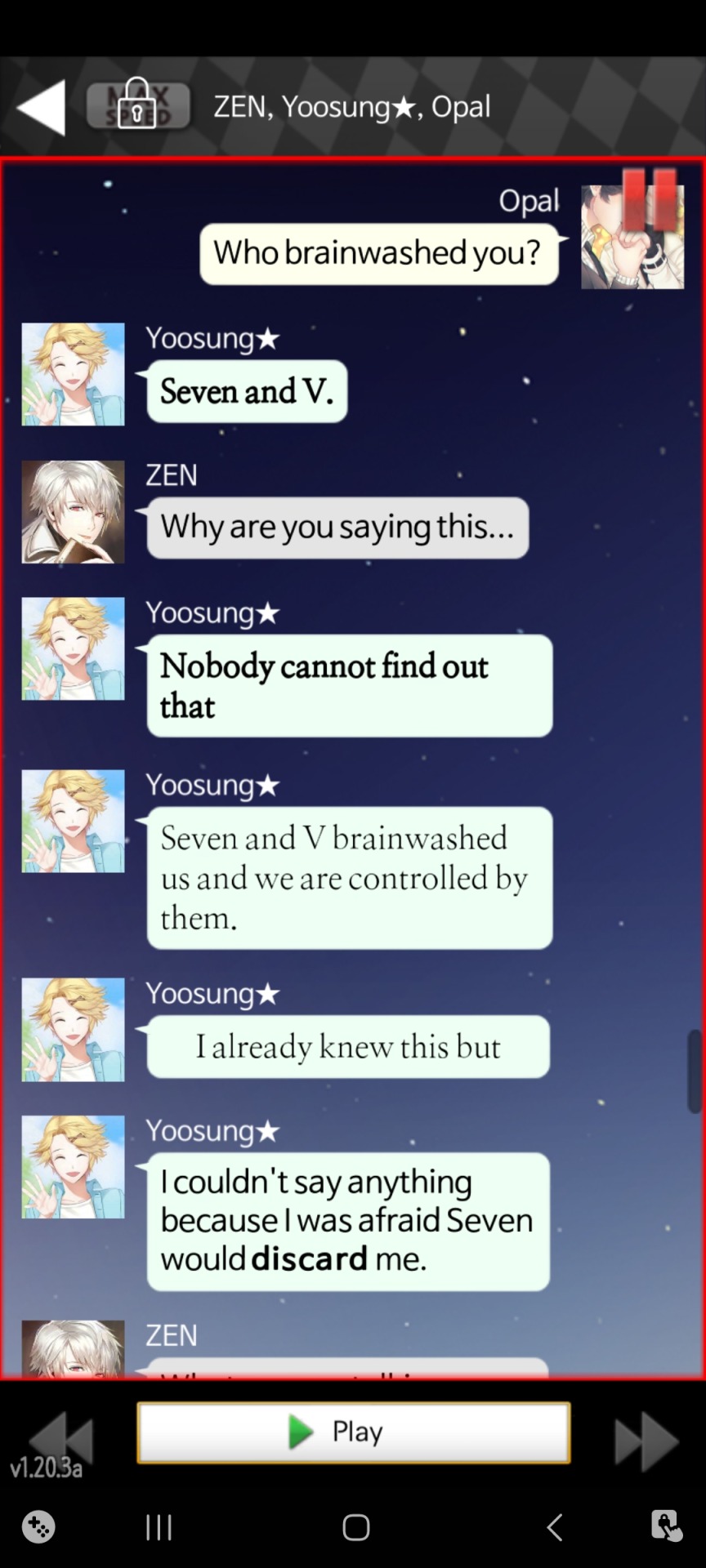

I discussed this ending extensively in another post, so I won’t get into too much detail. Basically, this ending shows how the RFA members might be machines, following an algorithm/script, and being controlled by V and Saeyoung. Yoosung says that the messenger is fake and that their only purpose is to hold the RFA parties. I also talked about how I think that V and Saeyoung are wizards who created this pocket universe.
Just a tiny addition to this point is that Jaehee breaks the 4th wall in this ending as well. After Zen and Jaehee visit Yoosung, worried about him after he started raving about how they are machines. In the screenshot above, at first, Jaehee treated Yoosung like he was delusional, and sent him to get a mental health examination. Despite saying this, her last 3 messages indicate her true thoughts. She believes him and chastises the MC/player for getting this ending. You only get this bad ending if you either don’t participate in enough chats or don’t get enough hearts to get into a character route. Jaehee is directly telling the MC/player to choose a route next time. Some people can get this ending if they try to balance getting hearts with characters, too. That’s actually how I got this ending originally because I was indecisive and kinda wanted to see what would happen.
2. Another Story Common Route Bad-ending (4th Wall Break)

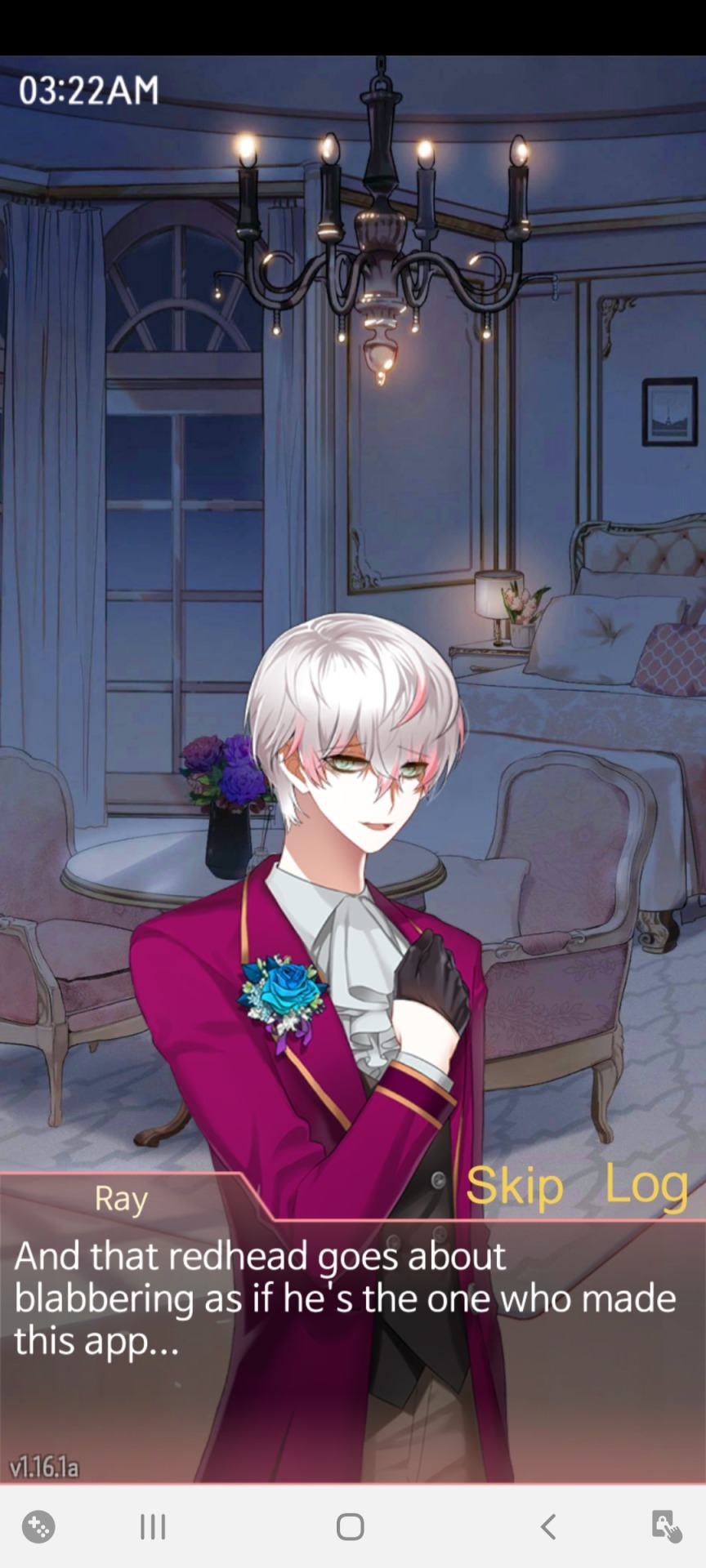
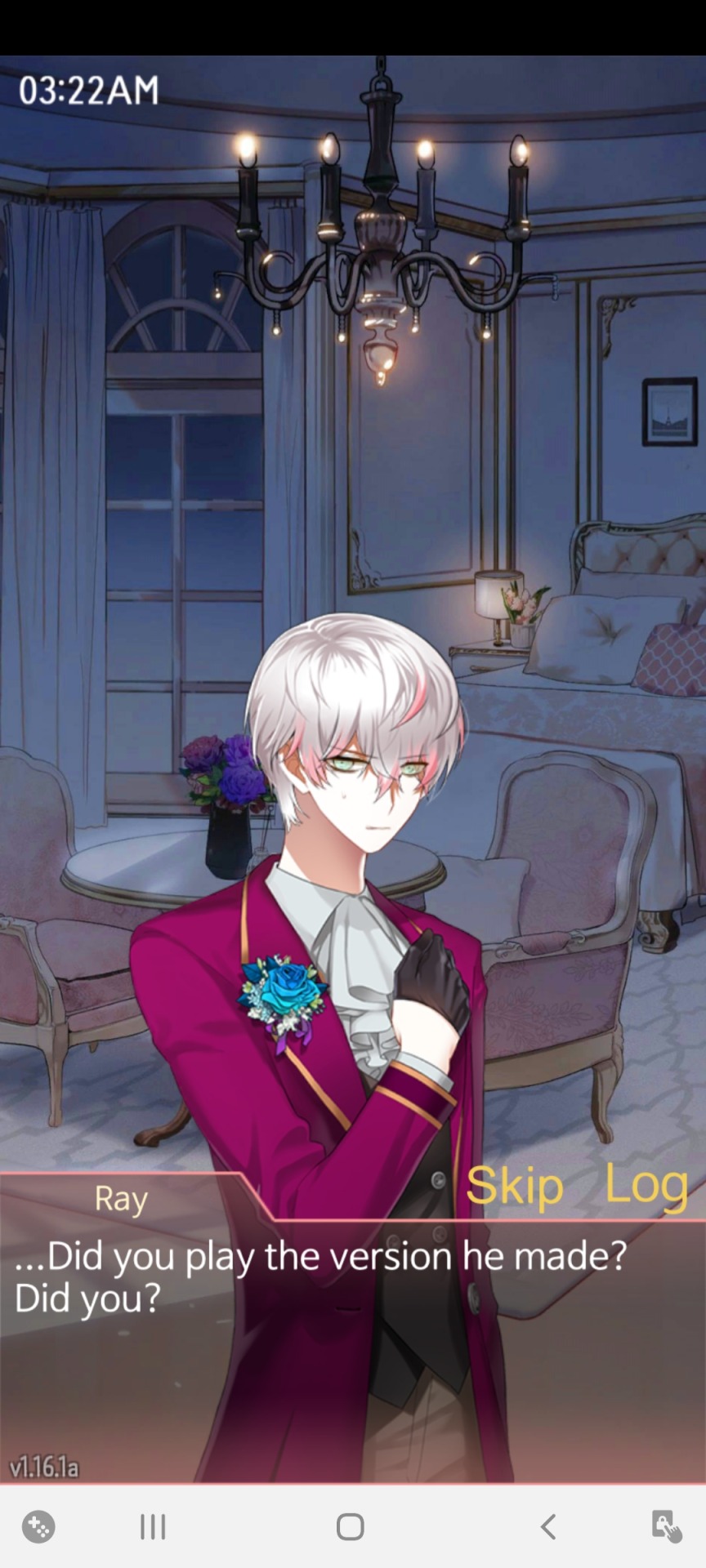
I went into detail about this one in my Saeran/Ray made Another Story post. In this ending, Saeran says that the RFA are AIs. In the surface story, this turns out to be a lie. Here in this bad ending, though, Ray talks about the RFA as if they actually are AI, even going as far as to mention Saeyoung (’that redhead’), asking if we played ‘his version’. I speculated that what he means by this is the Casual and Deep stories.
3. Dandelion and Nameless (References)



The first screenshot is from day 3 of the Casual story common route, the next 2 are from the April Fool’s DLC.
Zen is dressed up as Jisoo from Dandelion in the first ss, which is apparently a play that is being adapted from a book. The other reference to Dandelion is in the 2nd ss, an animal hospital named Dandelion is mentioned by Jumin and Jaehee. The characters from that game were part cat/rabbits, so this ref goes deeper than just a name drop.
Nameless: The One Thing You Must Recall is referenced too. Tei’s Tea Leaf is one of the plays Zen starred in. This is a reference to Tei from Nameless, Cheritz’s game before this. (I don’t know where this is mentioned in the game). Another example is in the last screenshot, the password that Jaehee mentions is from the title of the game. There is also a big reference to Nameless in Deep Story that another Tumblr user named smol-grey-tea has brought to my attention.

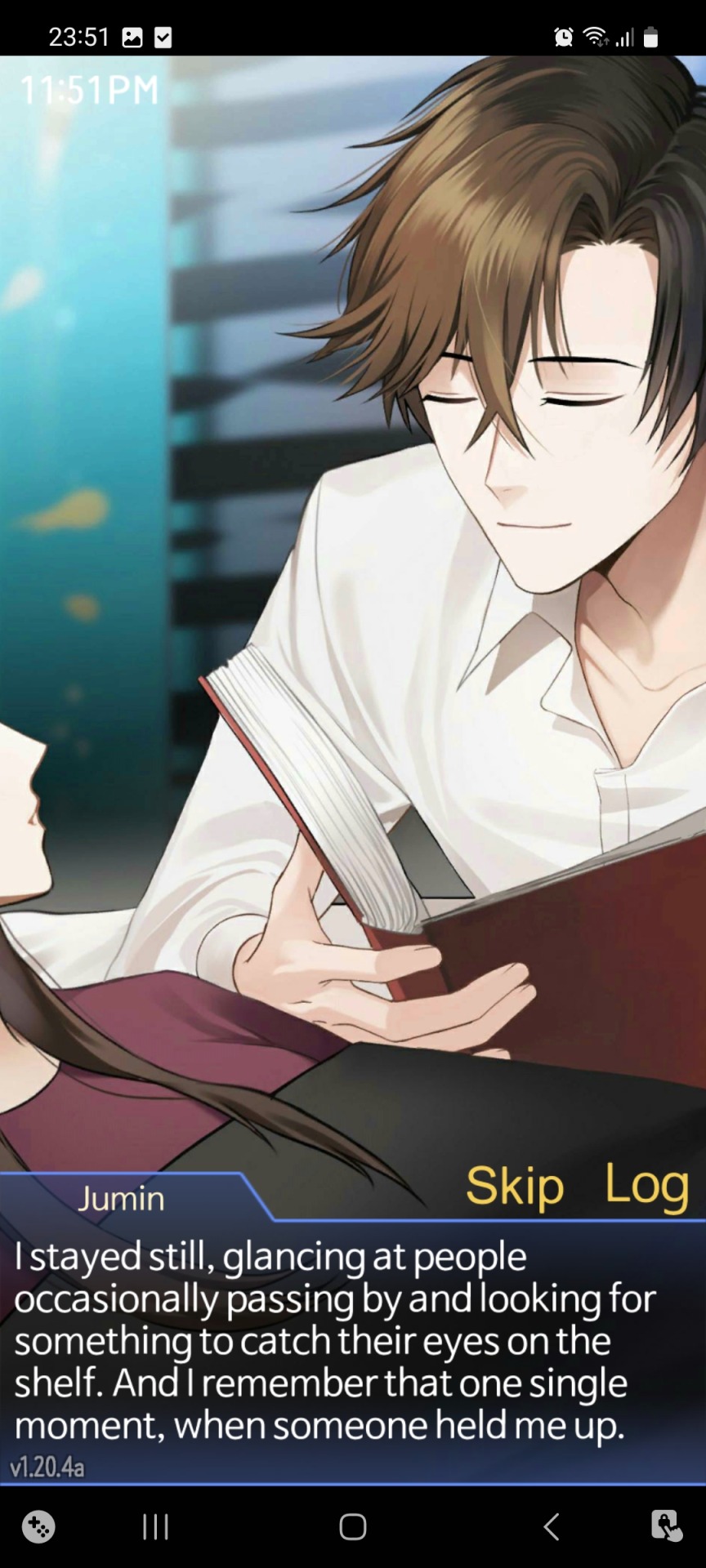
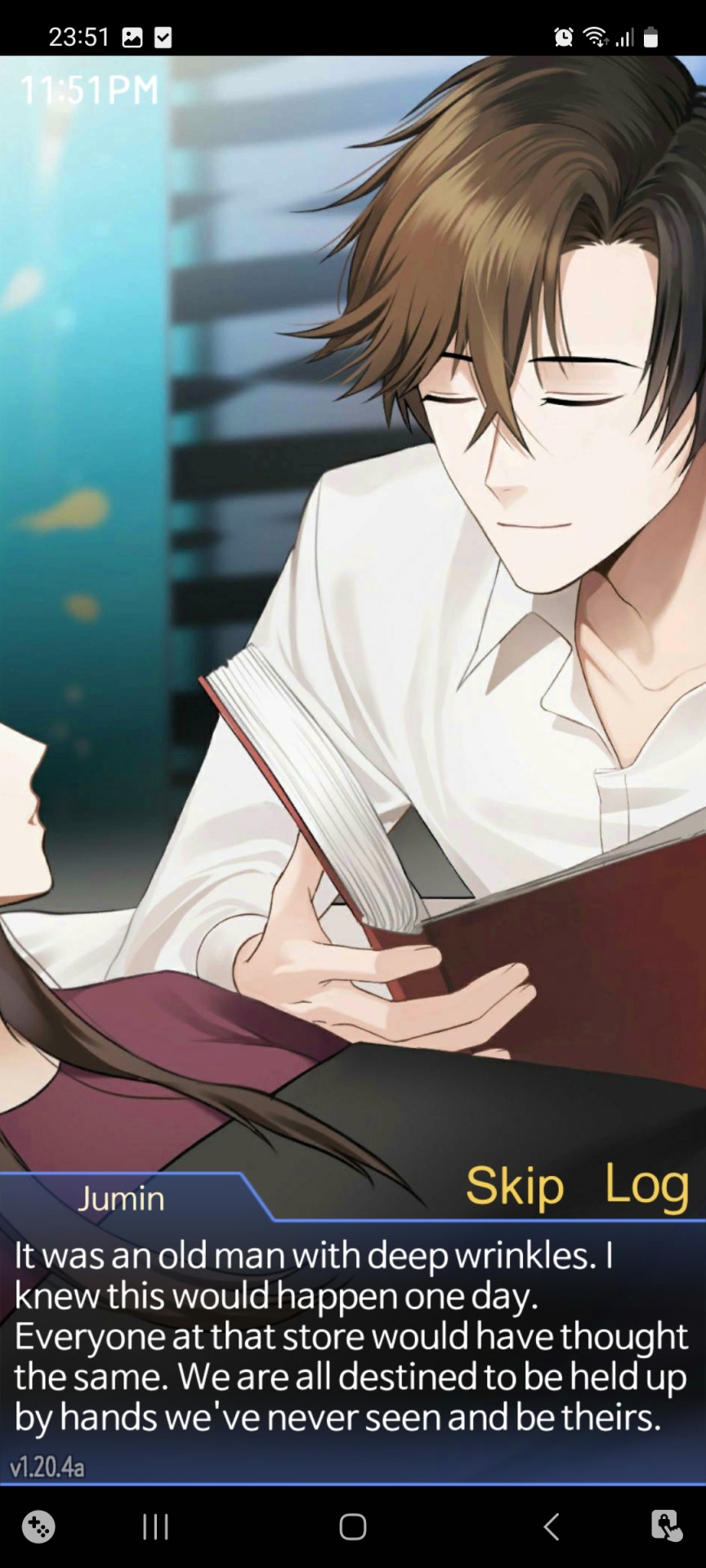






The story that Jumin reads to MC directly references Nameless’ backstory, which is revealed in the true route in secret ending 2. Nameless is the character pictured above as ‘???’ and he is a stuffed bear. The scene that Jumin reads is when Eri’s grandfather buys Nameless for Eri. The person who gave this book to Jumin is Rika. I will talk about the significance of this later.
EDIT: Here’s part 2 btw
#dandelion wishes brought to you#dandelion#nameless: the one thing you must recall#nameless#mystic messenger#mm#mystic messenger theories#mm theories#mysme#mysme theory#mysme theories#cheritz#cheritzverse#cheritz theory#cheritz theories#heejung kim#jumin#jumin han#jaehee#jaehee kang#yoosung#yoosung kim#eri#wizard#zen#hyun ryu#jisoo#zen mm#yoosung mm#707 mm
25 notes
·
View notes
Text
Interesting medieval Latin poems
Okay so I've been reading a lot of medieval Latin poems recently and some of them are pretty cool. My latin is unfortunately very limited so I've most been relying on translations. I am no expert in the field at all. A lot of these poems are quite long so I'm not going to post all of them. Some of them are just stuff I have written up part of in a google doc too so they aren't great.
Most of the translations I'm using are by Helen Waddell because she did an enormous amount of translation and her stuff tends to try preserve a lot of the meaning and poetic form over direct translations. Her translations are sometimes not all that direct but still poetic and neat.
This here is the Dies Irae, known as the day of wrath:

I've just stolen this straight from wikipedia because it's so famous. It is a 13th century poem of unknown origin got turned into a Gregorian chant and later became part of the traditional requiem texts as the Dies Irae sequence. As such there is a large number of music works for the text, the most famous being in Mozart's and Verdi's requiem. The text is often split into a large number of verses and makes up the full requiem sequence. The original Gregorian chant melody was picked up into general music works and being reused in a number of works (I believe the first instance of this is Berlioz's Symphonie Fantastique mvt 5). Overall just a very cool poem with some musical adaptations.
On a similar note a lesser known poem titled Dies Irea exists.
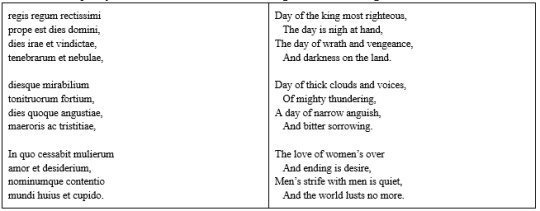
This poem here is by St Columba, a 6th century poet. Hellen Waddell suggests with her translations that it may be a precursor to the more well known Dies Irae above. This appears to just be a small snippet of the full poem by St Columba. It was set to music in 1962 by Benjamin Britten.
Another very famous poem is the O Fortuna:
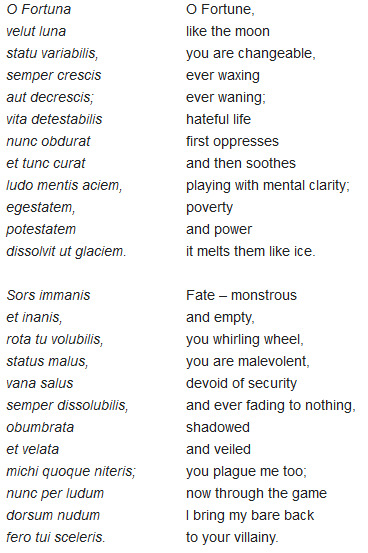
This too is just take from wikipedia and has many translations out there (Helen Waddell's isn't all that great I don't think and I don't want to type it out). The poem is of unknown authorship and taken from a 13th century manuscript known as the Carmina Burana. This manuscript is full of goliardic poetry. The goliards who wrote this poetry often spoke on topics such as love, fate, drinking. ect. A lot of this stuff was somewhat sacrilegious by 13th century standards and much of the poetry remains anonymous. Carl Orff famously took 24 of these poems and created the Carmina Burana, with the O Fortuna as the opening work.
One of the poets who we do (kind of) know the name of in the Carmina Burana is The Archpoet. The Archpoet had 10 poems, with all of his 10th and part of his 6th appearing in the Carmina Burana manuscript. Here is the Confession by the Archpoet:
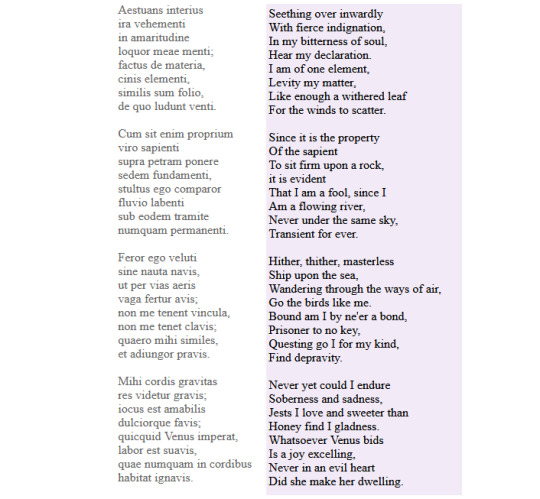
This poem is a personal favourite of mine. I've mostly seen the original poem laid out in four line stanzas with slightly different spellings in the Latin. Waddell's own translation spells the first line as "Estuans inrinsecus" but splits the original into eight line stanzas. I have no idea why this is but I just quickly found a latin one online that matched up with the translations by Waddell. I find this poem very powerful and the translation very well encapsulates both the poetic form and rhythm while keeping the original meaning intact. I have set this text to music myself and have most extensively studied the latin translations of any poem on this list.
Another Goliardic poem that appears in the Carmina Burana Manuscript is the Portrait Of Despair:

This translation is actually by George Whicher in his book "The Goliardic Poets; Medieval Latin Songs and Satires". The full piece is three stanzas long (at least in the book) but this one here is just the one stanza I wrote up. I think this verse is the most interesting anyways.
Another poem from the Carmina Burana Manuscript in George Whichers book is Iste Mundus, This Dizzy World:
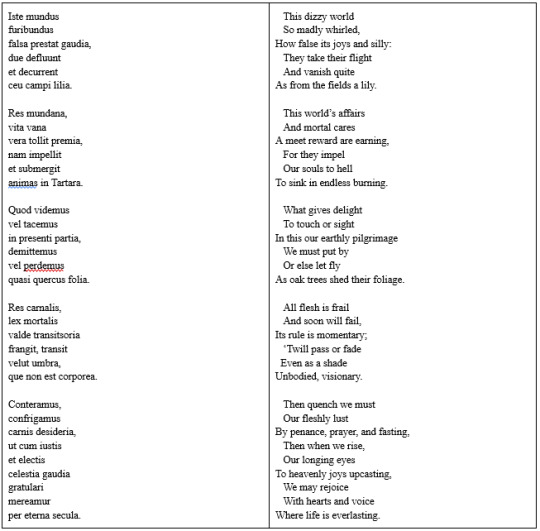
I don't really have a lot to say about this one. It just think it's neat
There are a bunch of other interesting ones I have that I might update this post with but that's a little collection of some of the interesting stuff.
#Autumn's Thoughts#latin#goliards#medieval poetry#I did not proof read this btw it's probably full of errors#likely the poetry I just typed up from the books also has typos
6 notes
·
View notes
Text
Here is, at last, an itemized list of my various problems and thoughts with The Fall of the House of Usher. Before you block, unfollow, report, and make a callout post, please be aware that I have an extensive blackmail list. Grazie
Flanagan is flanagan and incapable of not being moralizing and didactic. I think he takes one of Stephen King's problems to the nth degree which is a kind of... sentimentalism and a belief that Good Can Come From Horror. The need for horror to be meaningful and redemptive and in some capacity... joyous? Or at least morally Useful in the fashion of Victorian lit? doesn't make amazing art
He needs to let go of constantly casting his wife and their friends. Every time he brings in someone who's not in the "inner circle" they contribute more strongly and effectively than everyone else.
Case in point, Mary McDonnell. I know I came into the show liking her due to BSG Brainrot and Laura Roslin Pussy Disease, but frankly she can be inconsistent especially with bad directing; whereas here I think she actually provides a very strong foundation because, even though she's working with substandard material, she doesn't have to stretch herself very far to play Steely, Soft-Spoken Matriarch so she does ok--and "ok" is better than a lot of the rest of the cast. Same thing with Mark Hamill: he was such a bright point in this show and it was a great use of his skills in transforming physically as well as vocally. Carl Lumbly similarly did his absolute best with shite material and his role as being functionally a prop/occasional commentator in the frame narration.
The same thing happened when he brought in T'Nia Miller in Bly Manor and she blew the roof off that show. But now she's folded into the inner circle and she does amazing with what she's got, but pLEASE free her.
STOP. CASTING. KATE SIEGEL. PLEASE!!!!! And STOP casting that man playing Young Roderick, he gave NOTHING to the role, he contributed NOTHING. Mr. Gerald's Game literally carried the Roderick characterization all on his own. Can we say if he did well? Perhaps he didn't. But he was putting in the work.
There is an obsessive need to do too much, all at once, that really kills whatever minor crumbs of decent writing or atmosphere they manage to sprinkle around. Why do we need so many references to Poe that have so little to do with the original stories? Wouldn't it be more effective to pick 2-3 and do them right in a more tightly written story than to swing the bat at 8-10 works and maybe only hit 1 or 2 out of the park?
😭 listen, I'm not a genius nor can I or would I ever claim to understand the Black experience. But I certainly doubt a gay Black man in a government job in the 1970s would namedrop his male partner to a complete, white, heterosexual stranger, not even as a manipulative technique to create false intimacy or camaraderie. (Similar thing happened in Bly Manor where a Black woman who wanted to be a high-powered lawyer(?) took a job as a lawyer(?)'s NANNY to try to get a career opportunity with him? Um?) (Question marks after each instance of lawyer because I remember VERY little about the show honestly.)
The treatment of bisexuality as this decadent bourgeois predatory sexuality is actually INSANE in Usher. Please believe me when I say I am pro "bad rep," but Flanagan does not have a good history of thoughtful treatment of sexual minorities, especially female ones (cf. treatment of Trish [also an example of exoticising and marginalizing racism] and Theo [and to some extent Nell] in Hill House, the Jamie/Dani storyline in Bly Manor). And the way sex overall is portrayed and handled is soooo Everyone Is Beautiful And No One Is Horny.
There is this problem with all of Flanagan's adaptations, and Bryan Fuller does the same thing (I've seen it in both Hannibal and American Gods), where they just wholesale poach lines from the author's narration or other works and give it to their characters as dialogue. In this one they even have the grotesque indecency to have Roderick be the "author" of multiple of Poe's poems. HOW? WHY? HOW? WHY? Additionally, when they do this with the narration, it doesn't make sense as dialogue. Human beings don't talk like that except in very rare instances or if they're very pretentious. It just doesn't make sense. It's a failure of writing and imagination on the adaptor's part because they're not confident in their ability to visually create the atmosphere that the written line conjured and it's actually pathetic.
3 notes
·
View notes
Text
I can list a hundred things David Foster Wallace should have written before he wrote a book about tax accountants. One, and the most obvious, is a novel about Irish dancers on tour with a Michael Flatley figure whose influence grows more sinister over time. Pounds of verbal oil will be poured into his perm; his bulge will almost rupture his trousers. His backstory – but surely you can picture it. One dancer is addicted to weed, another feels like he doesn’t belong, and eventually Michael Flatley’s head, which has been seeming to grow on a parallel track with his sinister influence, gets microwaved successfully against all known laws of physics, and we have a moment where we hear all his thoughts as Death clogs his failing body through space and time. There. Done. The Pale King never needed to happen, nor all the rest of it.
Though there is one thing we wouldn’t want to lose: a character named Mr Bussy.
That’s how I felt before I read it, anyway. Criticism of the book at the time, less uneasy in its knowledge of Wallace (in fact performed at the peak of his sainthood), mostly centred on one question: Why did he choose to do it? As in, why would you choose to swim the Channel? Why would you lie on a bed of narrative nails? Why would you slip into the bodies of the men in grey flannel, the opaque fathers, the personified footnotes, the data mystics, the codes and by-laws among men? (We’ll get to the women later. If the male IRS worker’s backstory is that he carried a briefcase as an eight-year-old and had hyperhidrosis, the female IRS worker’s backstory is that she was diddled.)
Tax agents. Oh, I feared them. As far back as I can remember, my mother was always being stretched on the rack of something she called ‘an extension’. She saved every receipt she was ever given in a shoebox. Despite her efforts, we were always being audited for priest reasons, and every other year or so I found myself parked in a suffocating van, for hours on end, outside offices just like these. What was happening, was she being interrogated under hot lights? I had a sense of dark-suited agents walking among us, eyes on our daily business – on me, in the minivan, as I waited for my mother. I was a fearful child, as he was. I was also raised in Tornado Alley, with noticeably different results.
The Pale King was found by Wallace’s widow, Karen Green, and his agent, Bonnie Nadell: a chaos of paper, floppy disks, notebooks, three-ring-binders; words, some typed, some in his tiny handwriting, all adding up to hundreds of pages. There was no direction for its organisation, so they enlisted the help of Michael Pietsch, who ‘had the enormous honour of working with David as his editor on Infinite Jest, and had seen the worlds he’d conjured out of a tennis academy and a rehab centre’. In other words, a saint of 20 lb bond paper, who must have worked in a state of enthralled and transcendent boredom, of the type that Wallace had made it his mission to describe.
Pietsch assures us that had Wallace been in charge of the final product it would not have contained so many instances of the phrase ‘titty-pinching’. Judging by Infinite Jest, it would have contained more. He also offers the wistful hope that it would have contained fewer Doberman hand puppets. Dream on, I fear. But here’s the thing about The Pale King: it was going to be good. It was on its way to being good – in a Mister Squishee truck, on a rural highway, with a long fertile streak out the window. Wallace might have ruined it with his visions of what he called its ‘tornadic structure’. He might have ruined it with its women: the Toni Ware chapter in particular sounds like Cormac McCarthy breaking his hymen on horseback. (RIP.) He might have ruined it with his doubt, which caused him to turn somersaults like a cracked-out fairground child. (‘Is it showing off if you hate it?’ Hal Incandenza asks in Infinite Jest.) But it is there. The version we have stays largely in the personalities, and chapter after chapter, it is the impersonation of someone boring that allows him to rest.
It begins with the flannel plains of Illinois. The year is 1985, and the place is the IRS Regional Examination Centre in Peoria. Something to Do with Paying Attention first appeared as a long monologue in The Pale King – it comes about a quarter of the way through the book as Pietsch placed it – though Wallace had toyed with the idea of publishing it as a stand-alone novella. It is enthralling. ‘From what I understand,’ Chris Fogle says, at the beginning of his video interview, ‘I’m supposed to explain how I arrived at this career. Where I came from, so to speak, and what the Service means to me.’ He is trapped in the present, he disclaims. The work has had that effect on his mind, so that, ‘If I drank, for instance, some Tang, it wouldn’t remind me of anything – I’d just taste the Tang.’ Then he begins, beginning with his father, beginning with his ‘fairly long hair’, to remember.
‘Anyhow, all this was in the Chicagoland area in the 1970s, a period that now seems as abstract and unfocused as I was myself.’ He remembers his peace-sign pendant and his parents’ divorce and ‘everyone despising Gerald Ford, not so much for pardoning Nixon but for constantly falling down’. He remembers smoking pot with his mother and her new partner, Joyce, and watching them cry and stroke each other’s hair as they talked about their childhoods. He remembers thinking his father was one of a generation of men who were born to fill out a suit – but he himself was a ‘wastoid’, a nihilist; cycling in and out of three different colleges, marking time by the rotating neon foot he could see through his dorm-room window; feeling that he owned himself only in a pharmaceutical state he called ‘Obetrolling’.
My affinity for Obetrol had to do with self-awareness, which I used to privately call ‘doubling’. It’s hard to explain. I’m still not entirely sure what I meant by this, nor why it seemed so profound and cool to not only be in a room but be totally aware that I was in the room, seated in a certain easy chair in a certain position listening to a certain specific track of an album whose cover was a certain specific combination of colours and designs – being in a state of heightened enough awareness to be able to consciously say to myself, ‘I am in this room right now.’
I knew exactly what he was talking about, because I had once taken one of my brother’s Adderall and then gone to see Django Unchained. (Obetrol was later reformulated as Adderall. It was Andy Warhol’s drug of choice, and it literally does make you want to sell a soup label to someone for a million dollars.)
What makes a wastoid change his life? What could effect such a decision? In Something to Do with Paying Attention, it is a Jesuit who persuades Fogle to it, though it goes without saying that the Jesuit has long since been persuaded to something else. One day in late December 1977, just weeks before his father will be killed in a public transit accident, Fogle stumbles into Advance Tax by mistake and finds himself ‘particularly,uniquely addressed’. He remembers that the Jesuit was wearing a slightly racy watch (as in my experience they will). He lets slip the insider terminology that reveals his secret: he was once a probable ‘IRS wiggler’, who lived in the secular world. ‘Gentlemen, you are called to account,’ he tells them, and Fogle goes out, gets a haircut, and buys a grey wool suit. As in Infinite Jest, the death of Fogle’s father is technically impossible. It is a thing that cannot happen. But to step into your father’s shoes and become him requires just such an event; it requires a conversion experience.
The thing about the ‘I remember’ model is it’s inexhaustible, it can just go on. Recollection engenders recollection. Test it. Remember your local news anchors from when you were a child (mine were Rob Braun and Kit Andrews), describe their hair and cheekbones and your sense that they would never die, and go from there. Sing the jingle for the local pizza place. He is referred to as ‘“Irrelevant” Chris Fogle’ by the character known as David Wallace, who also says: ‘Given the way the human mind works, it does tend to be small, sensuously specific details that get remembered over time – and unlike some so-called memoirists, I refuse to pretend that the mind works any other way than it really does.’
The cast that surrounds Fogle is large, cartoonish and alive. All of them carry, as if in briefcases, their own small, sensuously specific details. There is the hyperhidrotic David Cusk, a kind of incarnation of the author’s own sweatband. There is the boy contortionist whose project is to put his lips to every part of himself – who ‘did not yet know how, but he believed, as he approached pubescence, that his head would be his. He would find a way to access all of himself. He possessed nothing that anyone could ever call doubt, inside.’ There is Merrill Errol Lehrl; I’ll allow it. There is the data mystic, the fact psychic who ‘tastes a Hostess cupcake. Knows where it was made; knows who ran the machine that sprayed a light coating of chocolate frosting on top; knows that person’s weight, shoe size, bowling average, American Legion career batting average; he knows the dimensions of the room that person is in right now. Overwhelming.’ There is Shane Drinion, the asexual tax monk who might actually be happy, who sits across the table from the ultra-fox Meredith Rand and levitates listening to her talk about her time on a psychiatric ward and her prettiness. And there are multiple David Wallaces. One David Wallace, wet behind the ears, with so notable a skin condition that he has catalogued the different kinds of attention people pay to it, might arrive at the office one morning and be taken for another.
As I read, I thought Wallace must have been taken by something very simple, the smallest sensual fact: that as an IRS worker you are issued a new social security number, in essence a new identity, a chance to start over. The old number, the old life, ‘simply disappeared, from an identification standpoint’. A whole novel could take flesh from that fact, one about the idea of bureaucratic identity as opposed to individual identity: memories, mothers, sideburn phases, the way we see ourselves. That we are, at our core, a person; in the bed of our family, a name; and out in the world, a number. Of course, as so often with Wallace, on actual investigation this turns out not to be true. The fact withdraws itself, and only the epiphany remains.
Why did he turn to it? Because it was impossible, probably – just as Infinite Jest had been to him fifteen years earlier. And when he took on the impossible book, something sometimes happened to him: a run, a state of flow, a pure streak. As those who are prone to them know, these simulate real living, which we are somehow barred from otherwise. ‘I’m deep into something long,’ he wrote to Pietsch in 2006, ‘and it’s hard for me to get back into it when I’m pulled away.’ He developed a habit of not leaving the house, in case he might write that day. ‘Once when I pressed him,’ Pietsch said, ‘he described working on the new novel as like wrestling sheets of balsa wood in a high wind.’ As he writes in one of his most typically tall-tale essays, ‘Derivative Sport in Tornado Alley’, he was, as a ‘near-great’ junior tennis player, at his very best in bad conditions. In fiction, he creates them; he serves himself sleet, hail, sun in the eye, all for the chance to play through them. Weather, from the beginning, was his best and most beautiful dimension; he trusted in The Pale King’s tornadic structure to finally lift him up. ‘Derivative Sport’ ends famously with a day on the court, hitting balls with Gil Antitoi. ‘A kind of fugue-state opens up inside you where your concentration telescopes toward a still point and you lose awareness of your limbs and the soft shush of your shoe’s slide.’ His life in tennis was spent chasing this moment, he tells us; he has been talking about fiction, too, this whole time. ‘We were young, we didn’t know when to stop. Maybe I was mad at my body and wanted to hurt it, wear it down.’ This funnel of concentration, this tunnel of play between people, rips somehow into the world and becomes force.
Ihave a tender partiality for the work in progress, and have always been electrified by the unfinished novel. My first was a copy of Juneteenth, which I insisted on buying instead of Invisible Man. Invisible Man was finished. The guy was invisible. Next. But Juneteenth held the secret, maybe. It was unbound. It bulged in the hand like a sheaf of papers, and Ellison was still alive in it, the process was ongoing.
David Foster Wallace – man, that name looked great. That’s part of it, right? – David Foster Wallace, colloquially known as DFW, died by suicide in 2008, after years of suffering, sobriety, intractable depression, Nardil and its discontinuation, shock treatment as a last resort; and throughout it all hand-to-the-plough hard work. The Pale King was released in 2011, was a finalist for the 2012 Pulitzer Prize. The lack of an award that year seemed to reproach the others on the list (Karen Russell and Denis Johnson) for still being alive. He didn’t get to finish.
In the ‘Notes and Asides’ at the end of The Pale King, Wallace is alive too; you can hear his voice tilting up with the question marks:
‘Film interview’ a sham? Point is to extract from Chris Fogle the formula of numbers that permits total concentration? Point is he can’t remember – he wasn’t paying attention when he happened to read the series of documents that added up to the string of numbers that, when held in serial in his head, allows him to maintain interest and concentration at will? Has to be sort of tricked into it? Numbers have downside of incredible headache.
His monologue unspools as my mother’s might have, under the hypnosis of hot lights. If ‘“Irrelevant” Chris Fogle’ tells us everything, everything he thinks and feels and remembers, won’t we eventually arrive at the string of numbers that does not bind but sets us free?
I was sceptical of Sarah McNally’s claim, in her brief and somewhat subdued introduction to Something to Do with Paying Attention, that it is ‘not just a complete story, but the best complete example we have of Wallace’s late style’, but that’s exactly what I found it to be. It is the first time his nostalgia sounded adult to me, looking back at childhood not just as the site of personal formation but as the primal experience of bureaucracy: queues, signs, your own name on the line, textures of waiting-room chairs. Waiting to become what, a person. It was not his childhood, perhaps, but it had some of the same surfaces, colours, engineered fabrics. Time to care about JFK again, or still. A kind of cinematic obsession with the sound of joints sucked in and breath held and the textural impact of gold-orange-green couches, invariably described in his work as ‘nubbly’. Posters and dropped needles and a vacancy in teenage faces, and finally he was far enough away.
Wallace’s idea of publishing it as a stand-alone text must have been born of desperation: he could not get the thing done. ‘But how to get this idea sold?’ he asks in the notes. ‘Is this a plausible plotline?’ He had the who, what, when, where; but the same thing that led these characters to the IRS left them motionless at their desks, what were they there to do, and where could they go from here? ‘Supervisors at the IRS’s regional complex in Lake James township are trying to determine why no one noticed that one of their employees had been sitting dead at his desk for four days before anyone asked if he was feeling all right.’
Perhaps Wallace was writing toward paradise, where the forms are also motionless. ‘Pay close attention to the most tedious thing you can find (tax returns, televised golf), and, in waves, a boredom like you’ve never known will wash over you and just about kill you. Ride these out, and it’s like stepping from black and white into colour. Like water after days in the desert. Constant bliss in every atom.’ He did not feel that, maybe, but he could make a man who did.
‘I don’t remember what I did with all my real attention, what-all it was going towards,’ Fogle says. It is always underlined in Wallace’s work, it is believed in without qualification or irony: your real attention. What is it, as a substance? An ichor that flows; a kind of beam that illuminates? Is it corrupted to look on the wrong thing? No, it is not corrupted. I would recommend that you read The Pale King in its entirety – it says something about how novels work, and how they don’t work, and how, if you are avoiding life, it is easier sometimes to exist in the very long middle of them. Something to Do with Paying Attention has the spirit of his best non-fiction, that of the set-apart morning, with a ray shining on the page. It both demonstrates his greatest gift and represents the desire to have this part of him set alone from the rest.
Experiment: use my brain damage to travel back to a time when we did not know this about him.
The memory wipe I experienced after Covid in 2020 extended backwards to 2018. Many who had died became alive again. David Bowie went on again for quite a while, a star painted over his eye. Certain things were very clear: people, places. But many things I had read online were just curiously gone. Betty White was either dead or a landlord. It all merged into a single uneasy datum, like a button under a desk or a composite face.
When I thought of Wallace, I saw two black and white author photos set side by side: one in a trench coat, another turned in profile. I remembered the phrase ‘moving car’, but only because it was something I had written. As for the rest, it was as if it had never happened, or had gone back into that original inch of secrecy between people. All this to say that when I picked up Something to Do with Paying Attention almost at random one morning, I could not have told you with any certainty what it was that he had done.
I did not think, here is the opportunity for a fresh encounter, a chance to read him as he was read back then. I simply picked it up and went on with it, absorbed. Poured out that peculiar quantum, my readerly goodwill. I thought, what is it exactly? He makes people feel they are in real possession of the word ‘volute’, that their vast untapped icebergs of vocabulary and perceptual detritus are readily available to them. His entire personality is present in the word ‘supposedly’ – it is actually frightening. How can the book be separate from the person. What are we reading when we are reading a book. What are we learning when we discover that someone was not good.
We knew he was not benevolent exactly (well, some of us knew) but there was the sense that he was suffering on the same side as us. Why we believed we were reading him for moral instruction in the first place I have no idea, but it did prefigure the primary way we construct morality now: to be paying attention. To everything. That means you. To read him freshly in a time of failure: his, to be loved; mine, to hold all the facts, to have paid enough attention to sit for the test.
As for whether we were foolish to love him, to emulate him, to rise to his challenge – there is an odd scene in a Joy Williams story called ‘The Blue Men’. (Do NOT read Joy Williams at the same time as DFW. It will give you a very bad opinion of him.) Two boys, maybe brothers, are playing catch with a tennis ball on a pier. ‘The younger one sidled back and forth close to the pier’s edge, catching in both hands the high, lobbed throws the other boy threw.’ One of Williams’s strange, terminal teenagers looks on. ‘That’s nice, isn’t it?’ Edith said. ‘That little kid is so trusting it’s kind of holy, but if his trust were misplaced it would really be holy.’ Trust in what, she does not specify. His brother, the ball, the boards, his body, the water, the world? ‘Like, you know, if he fell in,’ Edith said.
Infinite Jest – man, I don’t know. Perhaps I would have enjoyed it more had the rhetorical move not so often been ‘and then this little kid had a claw.’ It’s like watching someone undergo the latest possible puberty. It genuinely reads like he has not had sex. You feel not only that he shouldn’t be allowed to take drugs, but that he shouldn’t be allowed to drink Diet Pepsi. The highlights remain highlights: the weed addict Ken Erdedy pacing back and forth while reciting ‘where was the woman who said she’d come,’ the game of Eschaton, the passages where Mario is almost the protagonist, the beatified ex-thug Don Gately being slowly swept out to sea over the course of a hundred pages. Every so often Wallace offers you a set piece that’s as fully articulated as a Body Worlds exhibit – laminated muscles pinwheeling through the air, beads of plasticine sweat flying – or pauses the action to deliver a weather bulletin that approaches the sublime. The rest is Don DeLillo played at chipmunk speed. You feel it in your hands: too heavy and too light, too much and not enough. In the end, it is a book about the infiltration of our attention that was also at the mercy of itself, helpless not to watch itself, hopelessly entertained.
What were the noughties? A time when everyone went to see the Blue Man Group for a while. Men read David Foster Wallace. Men also put hot sauce on their balls. Tom Bissell’s intro to the 20th-anniversary edition of Infinite Jest, which is good both on its own merits and on the question of why someone would love the book, makes the pertinent disclosure that he read it as a 22-year-old in Uzbekistan. ‘As I read Infinite Jest in the dark early mornings before my Uzbek language class, I could hear my host mother talking to the chickens in the barn on the other side of my bedroom wall as she flung scatters of feed before them.’ He also acknowledges that ‘for the first few hundred pages of my initial reading, I will confess that I greatly disliked Infinite Jest.’ So did everyone, it would seem. There is a kind of bookmark in the space-time continuum, at the precise intersection of the year 1996 and page 150, where everyone simultaneously stopped reading. Possibly for all time. Beyond that point lay fraternity, the secret society, Stockholm Syndrome. ‘David, where be your jibes now?’ is the sort of thing you get to say if you made it through. You also get to write two paragraphs about where you were when you read it.
Stuart, Florida, where I had bought a copy from the Dead People’s Book Stall, a permanent stall in the flea market that inherited the collections of the recently deceased. I lugged it home along with a Hawaiian cookbook that suggested stirring chopped canned clams into a brick of softened neufchatel. I cannot remember whether he was alive or dead at that point; if he was alive, I was not his acolyte, but I liked the fact that he was there. If he was dead, I felt a brief stay in my own execution.
There was a certain freedom in admitting I was not the intended reader – one of my signature talents, then as now, is for never knowing when something is based on Hamlet. Still I began. James O. Incandenza’s head took up residence in my microwave. At times I was high on cough syrup; that helped. Occasionally I lifted my eyes to rest them on a canal with actual gators in it. My main sense memory is of it digging into my pussy when I propped it on my lap; one can only think this was by design. And maybe it wasn’t good for obsessive thinkers, or people prone to go into trance states while lip-biting. All of this is a roundabout way of saying that possibly it drove me crazy. You see, one corner of the back cover of my copy was torn, and I thought I could just even it out with an X-Acto knife – Lucky Jim’s sheet-snipping logic – and when my husband came home from work one afternoon he found me sitting in a pile of confetti, with a look like a dog that had just exploded all his friends in the henhouse, and he took the X-Acto knife from me without a word and hid it where I could never find it again. But there was something in me that saw this – correctly – as the only possible way to approach it: with a weapon.
For a long time Infinite Jest was one of those novels where, anytime you said anything about it, a little guy would pop up on the sidelines waving his arms and yelling, ‘That’s the point!’ ‘The original title was A Failed Entertainment! That’s the point!’ Sometimes, maybe. But the point not being, as Wallace well knew, any sort of apex of art. Even those who love it have trouble saying quite what it is. (People are always trying to make it the Ulysses of Boston. No one wants a Ulysses of Boston!) So what – is the serious, even the respectful question – what is this thing? Expanded far beyond its natural size, like a rat that has eaten insulation. One of its eyes hanging out on a red string. Raw with adolescence and early sobriety: like why would you make a rat be sober?
A modern reader will not find in it the book they read ten, fifteen, twenty years ago. They may find themselves lingering over those background touches that now seem to weave the majority: and then the stillborn baby was the colour of TEA, and then the cross-dressing undercover agent’s breast MIGRATED, and then a guy got together with a Swiss hand model who was a MAN, and then there was an IT in a Raquel Welch MASK who got diddled by her father into a state of carnal BLISS. But all these are carnival distractions. We recognise it as grotesque because it is grotesque: a book that will not let you read it.
I’m not speaking of the length, or the timelines that Wallace himself couldn’t untangle, or the footnotes that he somehow made famous although the footnote was a very famous thing already. At some point, you will find yourself in a state of pure nystagmus, moving your eyes back and forth across the page without conscious will. Almost the second you find yourself really reading he plucks it from you again. The game is not tennis, or chess-on-the-run, or Eschaton. It is keepaway. The Pale King, put together by note and hint, keeps us in the realm of the readable, whereas Wallace might have imposed a superstructure that made it impossible. I did deconstruct the physical act of reading while Infinite Jest was propped on my lap. Even perhaps read differently afterwards, as if I had been working with a loaded bat or training with ankle weights. In that sense it was valuable. But, and correct me if I’m wrong here, what Wallace wanted was to be read – the moment when we were really with him. It might have been a thrill to feel himself taller, and our reaching and yearning and outrage radiating to him from the ground, but time passes, and we’re older now. We can look him in the eye. What he wanted was the moment in Infinite Jest when LaMont Chu is visiting the guru who lives on the sweat of the young tennis-players; he notes that his power is in listening, in making you recognise that ‘He’s thinking as hard as you. It’s like he’s you in the top of a clean pond. It’s part of the attention.’
What Infinite Jest is creating is a future in which it exists. What it fears most is one in which it is not read. All throughout you can feel him, like, worrying about his seed. Whether he’s living up to his potential, to his regional titles, bending and trimming himself like a boy bonsai, sleeping at night with his talent in a pair of vaselined gloves. There is something grinding and awful and wrong in this, the same thing he observes in his essay about the young tennis phenom Tracy Austin: that there is something unnatural in watching a human being shape their mind and body so completely to a task. But then there’s the moment where he does – live up to it, I mean. ‘Here is how to avoid thinking about any of this by practising and playing until everything runs on autopilot and talent’s unconscious exercise becomes a way to escape yourself, a long waking dream of pure play.’ I am saying this as much to myself: to really be read you have to admit that you’re playing an even match. And he could have really had it, so why all the rest?
Time will tell who is an inventor and who is a tech disruptor. There was ambient pressure, for a while, to say that Wallace created a new kind of fiction. I’m not sure that’s true – the new style is always the last gasp of an old teacher, and Infinite Jest in particular is like a house party to which he’s invited all of his professors. Thomas Pynchon is in the kitchen, opening a can of expired tuna with his teeth. William Gaddis is in the den, reading ticker-tape off a version of C-Span that watches the senators go to the bathroom. Don DeLillo is three houses down, having sex with his wife. I’m not going to begrudge him a wish that the world was full of these wonderful windy oddballs, who were all entrusted with the same task: to encompass, reflect, refract. But David, some of these guys had the competitive advantage of having been personally experimented on by the US military. You’re not going to catch them. Calm down.
No, it was the essayists who were left to cope with an almost radioactive influence. He produced a great deal of excellent writing, the majority of it not his own. If he made mutants of the next generation, it was largely to their benefit: they were a little bit taller, with bigger eyes and a voice that was piped in directly.
‘I Really Didn’t Want to Go’, Lauren Oyler’s recent essay for Harper’s, is a rollicking, even Obetrolling critique of this. Aboard Gwyneth Paltrow’s Goop cruise, she thinks through Wallace’s ‘A Supposedly Fun Thing I’ll Never Do Again’ and writes that ‘during the years-long squabble over which of us lady writers would become the next Joan Didion, no one had tried to claim the title of David Foster Wallace for girls’ – why? The answer is obvious: too sweaty. Wallace perspires freely in the foreground, while Paltrow perches mauve-and-beigely on her stool on a far stage. He is dead and she is very very very very very very well; he’s still kind of more interesting.
If his non-fiction is almost amniotically soothing, it is because we consent for the duration to let him do the thinking for us. He is the cruise ship, deciding where to dock, when we should retire to our quarters, whether to offer us an afternoon of skeet-shooting or ping-pong or chess with a nine-year-old prodigy. He issues the dress code (a tuxedo T-shirt), manages the seating arrangements, and decides on the menu. Above all he presents multi-level opportunities to gorge.
In non-fiction the game is to really think something through. That was his task and he did it with joy, simultaneously obedient to that editor floating with his desk in mid-air, and performatively pushing its limits. The thing about an essay is it’s going to be read now. You’re not so much worrying about it being a touchstone for the future. So he relaxes, plays restful microtennis, lets us read.
And something else, too: it is a break from the book. An assignment comes as a kind of relief: not just you in your own mind. It takes you out into the world, even to the state fair, to see the clog dancers. The book is the thing that will not let you leave the house, because it might let you write it that day.
There was always something suspect about Wallace as a guru, the same thing that is suspect about anyone who applies for the position. It is hard to imagine William T. Vollmann, say, getting secondarily famous for a commencement speech that was basically like, ‘You know how sometimes you want to scream at a fat person in your mind?’ [Everyone cheers] ‘Well don’t!’ He warned us about MTV, porn, Walkmen, BlackBerries, music in public places and ALF. ‘The commercials for ALF’s Boston debut in a syndicated package feature the fat, cynical, gloriously decadent puppet (so much like Snoopy, like Garfield, like Bart, like Butt-Head) advising me to “Eat a whole lot of food and stare at the TV.”’ In one sentence he would offer a penetrating insight about our fractured attention span, in the next he would make it clear that he was legitimately afraid of David Letterman. Remember his dire warning in ‘Big Red Son’ that late 1990s porn would lead directly to snuff films? I mean, I guess it did, but really? One can imagine him a grown-up version of the awful little Heinrich from White Noise, who was also right, but who, moreover, was the new kind of person – and who, after the Airborne Toxic Event, gathered the rest of the refugees around him, suddenly eloquent, seeming to glow.
He did see a future (or shaped it) when all of us simultaneously forgot how to read. It is hard to mark a moment. In the US, it might have been when Go Set a Watchman came out, and so much criticism seemed to proceed from the consensus that Atticus Finch was a real guy and we just found out something bad he had done. Whole books seemed to blink in and out with the cursor of some highlighted line. We seemed less a collective intelligence than a guy holding a mosquito clicker, and what we were doing had less to do with reading than a kind of quick, scanning surveillance – for what, what danger? Not to have seen it coming.
There is a countenance in art. This is the thing that cannot be killed. There is an eye in the painting that looks back at you. But perhaps we now felt ourselves part of the composite – scanning with other eyes, reading with other minds. I mean who cares if he pre-invented Instagram filters? What now seems most prescient is that he anticipated a time when reading would be accomplished more by a kind of hive-like activity rather than individual effort. This benefited him for a while, as he was the Great Group Read. But what he created, more than the Enfield Tennis Academy or Ennet House, more than any of the people or ghosts that moved through them, was a reality in which Infinite Jest could live only so long as it stood as a challenge.
That’s what it was. In 2018 the poet and memoirist Mary Karr, who had been briefly involved with Wallace in the early 1990s, took to Twitter and accused D.T. Max of understating Wallace’s abusive behaviour towards her in his biography Every Love Story Is a Ghost Story. The mode suddenly switched from ‘lovely, peak-lipped mouth that was his best feature’ into a kind of embarrassed silence or I saw it all along or He was never important to me anyway. We had first thought of him in terms of his genius, and then in terms of his suffering – how to hold these things in the same hand as his threat?
I had read an earlier account of the relationship in Karr’s memoir Lit (on the Kindle, multiple times; also wiped) but the picture she presented now was more extreme. Karr wrote that Wallace had been obsessed with her: ‘tried to buy a gun. kicked me. climbed up the side of my house at night. followed my son aged five home from school. had to change my number twice, and he still got it. months and months it went on.’ The facts – he threw a coffee table at her? he followed her five-year-old son home from school? he pushed her out of a moving car? – seemed almost unassimilable with the figure. You expect Norman Mailer to stab someone. You don’t expect the author of ‘This Is Water’ to stalk someone for years.
He often made light of his obsessions in interviews: Alanis Morissette. Melanie Griffith. Margaret Thatcher, leaning forward to cover his hand. These anecdotes must have gone over queasily even at the time; being obsessed with Margaret Thatcher in college is not within the typical range of human behaviour. He had imported Karr wholesale into Infinite Jest as the PGOAT (‘Prettiest Girl Of All Time’), he had reproduced her Texas idiom to the point of impersonation, with the farcical claim that the character was from Kentucky. He had even written the novel, he claimed, to impress her, ‘a means to her end (as it were)’. That was one kind of offence; this was another. ‘But that’s insane,’ my husband said simply, when I took him through it. ‘Who does something like that? What kind of person?’
Between my first reading of The Pale King and the second, I found myself dwelling on the tête-à-tête in the novel between Shane Drinion and Meredith Rand – a very funny name for an ultra-fox, by the way, and which follows the same basic syllabic pattern as some of Wallace’s other ultra-foxes. She confesses that in high school she was a ‘cutter’ – someone who turned her obsession inward, rather than out. (Wallace once showed up at Karr’s house with bandages on his arm; she thought perhaps he’d cut himself, but instead it was a tattoo of her name.) The section is a disappointment: a hundred-plus pages, a psychiatric ward, and why is this conversation still about prettiness? It was the wall he hit in fiction; the thing he could not think his way beyond. But I kept thinking of Drinion: the man with no apparent desire, who was happy; who claimed to not get lonely; who listened; who levitated as the ultra-fox droned on.
I could step into her place. When I was on the ward, there was a boy who got obsessed with people. In group therapy, I remember him saying, of his neighbour, ‘I just know that she and I will always be in each other’s lives.’ I found this fascinating. He was unthinkable to me: you get obsessed with people? I was unthinkable to him: you tried to kill yourself? He turned his attention to me that day, directed his speech towards me, curled up on the couch when I left. Fascinating. He was a child, he was basically wearing a striped Ernie shirt. He was doing it, and it was also something happening to him. He was a fellow sufferer, I thought. He was. And then, get out before it happens to you.
The most anyone would say is that after Infinite Jest, Wallace’s fiction ‘grew darker’. This was in reference to Brief Interviews with Hideous Men, a collection of 23 short stories published in 1999 that seemed designed to test his own maxim that ‘Fiction’s about what it is to be a fucking human being.’ Its subject matter ranges from rubbed raw red thingies to diving board reveries to child mortality. Some professed to prefer it, or considered it the apex of his achievement. I refreshed my knowledge of him just before reading it, and that must have had an effect: probably we would feel differently about David Lynch’s darkness if actual ears kept turning up in his backyard.
Zadie Smith wrote an indispensable, somewhat tortured essay about this collection, begun when he was alive and published after his death. It’s an example of the generosity, the lavishness of mind, the almost rabbinical close reading he inspired at his peak. Smith really sees him in her brackets: ‘There are times when reading Wallace feels unbearable, and the weight of things stacked against the reader insurmountable: missing context, rhetorical complication, awful people, grotesque or absurd subject matter, language that is – at the same time! – childishly scatological and annoyingly obscure.’ But – there was always a but – it was almost a holy belief at that time: stick with him, it’ll be worth it.
I had a copy from early on that I never read past ‘The Depressed Person’. It seemed to me then, and it seems to me now, a sick book – not in the puppy sense, but actually ill. The language appears to be genuinely infected, not one of his vernacular performances. It is variously trapping you in its methamphetamine armpit and chasing you around with a worm, but it doesn’t appear able to do anything else. Was it at this time that he lurked in Barnes and Nobles, lingering near the self-help shelf? ‘Don’t think I can’t speak your language,’ Hideous Man #20 tells the interviewer, whom he refers to somewhat pleasingly as a short-haired catamenial braburner; he does, but completely, it has taken him over. ‘It’s a little perverse, in fact,’ Smith observes, ‘how profoundly he was attracted, as a fiction writer, to exactly those forms of linguistic specialisation he philosophically abhorred.’ But that was the thing about TV, too. It’s not that he didn’t have insights about it. It’s that the blue ongoing light of it, the Entertainment, kind of did seem to have melted his brain.
Jonathan Franzen is correct to emphasise his rhetorical gift; sometimes just when you’re hating it most, you are being won over. Did he want ‘faithful readers’, as Smith asserts, or did he want the moment he knew that he had them? ‘The record indicates that this sort of sudden reversal of thrust happens right when I have the sense that I’ve got them,’ Hideous Man #2 confesses. Or Orin, in Infinite Jest, with his ‘need to be assured that for a moment he has her,’ ‘that her sense of humour is gone, her petty griefs, triumphs, memories, hands, career, betrayals, the deaths of pets – that there is now inside her a vividness vacuumed of all but his name: O., O. That he is the One.’ The answers that anchor the collection, delivered by hideous men in response to blank questions, take it in their turn to pursue, repulse, and finally persuade us: but to what?
I have always appreciated Wallace most in his monologues and I can, like my father, hear confessions all day; Hideous Men ought to be my book. Instead, I found myself generally standing opposite to Smith’s assessments: I think ‘Forever Overhead’ is juvenilia, I find ‘Church Not Made with Hands’ to be rank fraud, and I would like to put ‘Octet’ in my ass and turn it into a diamond. Attempts to operate in the register of the profound fail; poetry deserts him, having once been insulted; and I did not laugh once, and then for a different reason, until I got to the line, ‘That’s right, the psychopath is also a mulatto.’
The truth about Brief Interviews is this: it only gets good when we’re about to be raped. We are, for the purposes of this encounter, a daffy granola hippie whose hot body is momentarily shed of her poncho, as Hideous Man #20 tells the interviewer the story of the night she unwisely got into a stranger’s car: ‘I did not fall in love with her until she had related the story of the unbelievably horrifying incident in which she was brutally accosted and held captive and very nearly killed ... By this time she was focus itself, she had merged with connection itself.’ He lets the grass sharpen for her. Only at this point will he let go of prettiness, let it be gone. The prettiness goes into the world, into the grass and the phlox and the gravel, and becomes what he will never grant her: actual beauty. ‘Can you see why ... it didn’t matter if she was fluffy or not terribly bright? Nothing else mattered. She had all my attention.’
The book, at this moment, seems unfinished too. You think, if he can really set down everything he finds in the girl’s face, he’ll get there. Don’t miss the reflection in her eye, that’s you. Our desire puts the pen back in his hand; his breath hasn’t stopped, we are holding it for him. We’re thinking, it’s not over, he could still get there.
It can still be ours, is the thing. There is a great deal of handwringing about whether we can still enjoy the work of hideous men. The question is not typically how to root out influence. It is whether we can still enjoy, but we are reaching for another word beyond it. What we are asking is whether we can still experience it without becoming these men.
Of course we become them. That is the exercise of fiction. That the passage about the hippie wakes for me is a kind of rueful proof. If they were powerful, we become powerful. If they had the words, we have the words. ‘Judge me, you chilly cunt. You dyke, you bitch, cooze, cunt, slut, gash. Happy now?’ Yes, David. Thanks for the grass.
You open the text and it wakes. This is the thing that cannot be killed. ‘Since we all breathe, all the time,’ he writes at the end of The Pale King, ‘it is amazing what happens when someone else directs you how and when to breathe.’ The novel does this, as much as any hypnotist. The rhythms of another person’s sentences do this, wind across the grid, Illinois, their attempts to keep their mother alive for all time by reproducing her idiom down to the letter. It’s in your mind now: levitation. It’s in your mouth now: Obetrolling. ‘And how vividly someone with no imagination whatsoever can see what he’s told is right there, complete with banister and rubber runners, curving down and rightward into a darkness that recedes before you.’ You open a text and it wakes. What is alive in it passes to the living. His attention becomes our attention. It can still be ours, sure. Do with it what you will.
1 note
·
View note
Text
Unit Teambuilding - Anabel
Did you know that Anabel is listed as Alolan? The Kalos VA got one of its units designated to Alola. That’s rough, buddy. Hoenn had similar with Looker being Sinnoh, I guess. It still stings, given how much help Kalos needed. But hey, I’ll take it. Anabel being in here means Alola is free to have more options. Maybe Lusamine and Nihilego can be real. But Anabel is getting something cool, right? Mega Salamence? Raikou finally gets in, completing that trio? An Ultra Beast?!
SNORLAX? Does Anabel even use a Snorlax? Apparently the answer is yes, it's literally the only Pokemon on every iteration of her team across Emerald and Gen 7. Hmm. I don't love it, but the lore has spoken.
General Overview
Anabel, like Champion Calem, is a fascinating look into what happens when a unit is designed to support a specific option, rather than the meta at large.
Anabel has Headbutt, and does get Aggravation on grid, which is the best broad tool she offers. Reflect is...a choice. Protect is...a choice. Her trainer move provides crit shield, status shield, special shield, and +2 attack for the team, but is notably, only 1MP. Her passives provide +1 special defense for each use of an MP move, +20% to all stats when a field effect that only applies to the allied field are in play (note how this removes weather, terrain, and zone as possible benefits, jerks), and restores 50% HP on first use of Max Move. Her stats are decent, hitting over 300 in both defenses, and over 800HP. Which is a lot! That's not bad as a tank.
Where she falls apart is...well, everything else. There's no extension of these effects, which I think is a severe limitation, given Melony, a general pool, received such extension. Her only other healing is Healthy Healing, and her only team-based healing is a 5/5 grid tile that's really out of the way, and reliant on her taking sync every time. Sure, she has utility like boosting crit and Durable on trainer move, or ways to consistently boost defense in addition to special defense, or the coveted Stalwart/Unbending combo, but this ultimately accomplishes little for her, as she has few options that are accessible once accounting for the flinch rate. Anabel just can't reach enough to feel like she stands out on paper.
So I asked myself, what is the point of this? Why set her up in such a bizarre way? Then I realized...it's because of Looker and Emma. They're both really self-sufficient with their buffing, only requiring +2 attack, which she provides. Everything else is survival, which she, again, provides. Her gauge control is bad, but Emma's giving +4 speed so who cares? Anabel was designed to work with the family, and that's created this bizarre situation where she's kinda locked into it, and structures similar to it. She cannot, under any circumstance, cap a stat. Her allies need to be fully self-sufficient, and she can’t even quickly get to +2 crit, unless you use GMax Replenish too early and lose out on recovering MP from all her moves at once. With such severe limitations, is there really a use for her?
Yes, but it’s situational. While her kit is weak at buffing, a little bit of crit rate and attack support is sometimes all you need, and a 60% flinch rate on your support is never a bad thing. Blocking debuffs from otherwise major threats like Azelf is huge. And of course, her personal survival makes her incredible at tanking hits from major offensive threats like Regirock or Cobalion, having two instances of blocking damage and using Endure. That's a lot of utility in one unit. But moreover, anyone currently going through the horrors of Regirock this Gauntlet has probably noticed how devastating it is to have a high-powered, guaranteed crit AoE attack thrown at you. Anabel blocks it. Crit shield denies the guaranteed crit effect, and with the damage shield in play too, she can just blank the whole situation. And blocking status twice? Look who's one of the only effective answers to Cresselia's two distinct status uses.
Anabel is a very unusual unit, who doesn't seem to excel at...well, anything. But the generalized utility she brings is quite unique, and I think the options she does have hold a lot of value.
EX and Move Level?
She's support, so EX is always a great idea for the tanking. Move level is also pretty critical, since like most supports, it's really the grid that makes things work. Otherwise you have half the flinch rate, less healing, no ability to block defense stat drops, etc. I will shoutout 2/5 grid, though, for having healthy healing and the Stalwart/Unbending combo. Can probably do some good with that.
Team 1: Anabel, Looker, Emma
The family is assembled, this is a go-to for me now. Anabel provides the last bit of attack they need, and a ton of defensive support. Emma provides fantastic speed control with a quick +4 to all allies, and then any team weak to Poison is just done.
Team 2: Anabel, Kahili/Lodge Silver, Tech Farfetch'd/Tech Gyarados
Anti-Bulu and anti-Entei. Anabel has a high flinch chance, meaning she can dead lock foes that don't resist it. Kahili and Lodge Silver have the ability to truck these fights fast enough that Anabel doesn't have to worry. Do note, Silver requires you to have GMax Replenish for the trainer move to cap his crit.
Team 3: Anabel, SS May, Tech Magmar
Anti-Cobalion. SS May is brought up because she needs +2 attack to finish her particular job, and +1 crit to get full sync benefits after just two actions. Anabel can supply both in one move. Tech Magmar then provides the Sun, for May to absolutely destroy Cobalion.
Team 4: Anabel, Noland/Guzma, Parasect
Azelf is mostly known for being sleep-weak, but it's similarly flinch-weak too. This means Anabel can lock it down, then avoids defensive debuffs with Stalwart/Unbending. Noland is chosen because...man there's really not many options. Like, I'll bring up Guzma since it saves a turn buffing, but I worry about severe gauge issues with that team composition. Parasect has Screech, and can paralyze so this technically counts as answering Cobalion and Tornadus I guess? I’m not convinced about Torn. It’s super flinch resistant and Anabel can’t heal allies.
Team 5: Anabel, Grimsley, Nanu/Sandslash
Anti-Cresselia. See, Anabel has something quite potent, in two uses of Status Shield. This will block Thunder Wave in the early phase, and Toxic in later phases. The main question to ask then is...well, what do you bring to supplement? Grimsley with Snatch deals well enough with Cresselia, but the decision between Nanu's Screech for better sync performance, or Sandslash for Trap for initial phases, needs to be considered. Either way, you want someone who can self-buff speed, because Anabel is slooooow.
Team 6: Anabel, Palentine's Marnie, Masked Royal
Time to mess Regirock the heck up. P!Marnie needs one more point of crit, and Anabel can provide. Marnie can self-buff her attack somewhat, but Anabel can bring it to cap without much issue. The only real problem is speed control, which is why Masked Royal is here. This is overkill, but like...I dunno man, it was this or I admit Marley is a better fit for Marnie here.
Team 7: Anabel, Sidney, Parasect
While perhaps unusual, one thing I noticed about using Sidney in this Gauntlet was that Confuse sucks against Uxie if it's applied by attacking. Sidney needs confuse to do anything, but Uxie grows to immunity with it. Enter Anabel, who can cap his attack for optimal nuking conditions, but also can hit a flinch just before his sync explodes. Parasect covers status and defense drops.
Final Thoughts
I think Anabel is...interesting, but maybe not strictly good? If that makes sense? Like my biggest issue is that Anabel has a lot of tools that look like they should do well together, but ultimately wind up falling apart a bit on close inspection. Her buff kit is outright bad, and her field effects aren't sustained long enough to matter as much. It's just a messy set for a character who should be doing a bit better. But oh well. Maybe when she gets an alt in the Alola VA, right?
2 notes
·
View notes
Text
Motives behind the significance of data science in 2024
Let's Define Data Science.
The term "data science" describes the sophisticated analytical methods and scientific ideas applied to the extraction of meaningful and applicable information from given data. Companies use data science to design strong strategies and make decisions, which among other things leads to successful outcomes. The generation of insights is greatly aided by the rich data that is collected via the application of data science in business. These insights give businesses the chance to find new clients, increase operational effectiveness, and greatly strengthen their marketing and sales initiatives. Data science is hence pervasive. A survey states that analysts project 11 million data science employment opportunities in India alone by 2026.
Data Acience's Applicability
Today's professionals leverage cutting-edge technology to gain actionable insights in a world driven by digital technology. The value of data scientists has increased as more organisations are opening up to Big Data. Contemporary companies are unable to survive and compete in the commercial sector without data. Data analysis and processing have a great deal of value, and this is where data scientists excel.
Data worldwide will reach 175 zettabytes by 2025, predicts IDC. Businesses may now effectively analyse massive amounts of data from many sources and gain insightful knowledge to make more informed decisions based on data thanks to data science. In a wide range of business sectors, including marketing, healthcare, banking, finance, policy work, and more, data science is extensively used. Data science is significant for the reasons that follow.
Advantages of Data Science in Several Industries
Businesses are not the only areas that have found that data science provides them with a high degree of convenience and skill in carrying out their daily regular tasks. Because of this, data science is now critically needed in their industry. The following list includes a few more domains where data science is particularly advantageous.
If you are looking for the best MBA Degree visit here
Data Science in Medical Fields
There is no room for error in the healthcare sector because it is one of the biggest and most important in any country. It is not possible to manage the massive volumes of data produced in the healthcare sector manually. Technology is needed to aid with it. Data science has made it easier and more effective to manage all of the records, including patient histories.
Data Science in the Banking Industry
The banks' database is enormous and contains valuable information about their customers, such as their transactions, history, patterns, etc. The banking industry has transformed the way banks used to operate, making them more efficient, by incorporating data science into their routine applications. They are now operating more efficiently, and they can now do data analysis with ease.
Bankers can stop and identify fraud in their institutions by using data science. By examining the customer's financial transactions and identifying any unusual activity, it assists them in gathering, compiling, and forecasting any fraudulent conduct. Additionally, it aids in risk modelling, which is the process of figuring out how much financial sector commodities and goods should cost.
Data Analytics in Retail
Recognising consumer patterns helps a retail firm operate well. They can use it to help them create marketing plans that will help them advertise their business and increase leads and sales. But remembering the tendencies that every consumer follows isn't always feasible for an individual.
In the latter stages of her pregnancy, a pregnant consumer, for instance, would concentrate on plus-sized clothing or perhaps purchase for children's clothing. With regard to maternity or baby buying, it will be advantageous for the retail outlet to give her offers and sale intimations by mail or texts. Data science technology works alone to complete such a task.
Data Science in the IT sector
These days, creating and using information is a vital economic activity. Data science makes it easier by enabling the extraction of information from massive amounts of data. By swiftly collecting and analysing vast amounts of data to produce results in hours rather than days or weeks, information technology improves our quality of life.
If you are looking for the best MBA Degree visit here
How to begin a Data Science career
Obtain the necessary degree: Pursue an appropriate undergraduate degree as a first step if you wish to investigate a career in data science. A degree in computer science, statistics, mathematics, engineering, technology, or a similar field is something you can pursue.
Get a master's degree: Investigating a profitable career in data science requires a master's degree. You can choose from a wide range of master's programmes in data science, including an MSc in data science, an MBA in data science, or even a postgraduate certificate.
Acquire technical skills: To succeed in your role as a data scientist, you'll need to acquire technical skills. Working with large data sets is a must for data scientists. It's crucial to have knowledge of data wrangling, data visualisation, and reporting.
Acquire coding skills: Data science requires proficiency in coding. Proficiency in high-level programming languages such as Java, SQL, Python, and R is necessary to handle intricate datasets.
Learn how to use the tools: One of the most crucial aspects of becoming a data scientist is creating charts and graphs. It is necessary to have knowledge of programmes like as Tableau, PowerBI, Excel, and PowerPoint.
Attend an internship: Acquiring practical experience is crucial, even though obtaining a degree in data science will provide you with technical knowledge and abilities. Taking an internship in data science enables you to learn about the types of problems you deconstruct and how teams work.

Top Data Science Degrees to Pursue
Finding the right kind of employment is mostly dependent on having a master's degree in data science. The most well-liked degrees for a career in data science are listed below.
If you are looking for the best MBA Degree visit here
MSc in Data Science
The strongest encouragement to pursue well-paying jobs in data science is provided by a Master of Science in Data Science. You will graduate from this programme with the skills necessary to pursue technical positions in data science, including programming languages, statistics and probability, data visualisation, and data mining, among other topics. Additionally, you will learn how to use in-demand tools like Pandas, Apache, R, NumPy, Hadoop, and more.
MBA in Data Science
You may advance your career by gaining the essential knowledge and abilities with an MBA in data science. In this programme, you will learn various facets of business management in addition to acquiring technical knowledge and abilities. This degree opens doors to a wide range of professional prospects since it combines technical knowledge with business savvy.
0 notes
Text
I can list a hundred things David Foster Wallace should have written before he wrote a book about tax accountants. One, and the most obvious, is a novel about Irish dancers on tour with a Michael Flatley figure whose influence grows more sinister over time. Pounds of verbal oil will be poured into his perm; his bulge will almost rupture his trousers. His backstory – but surely you can picture it. One dancer is addicted to weed, another feels like he doesn’t belong, and eventually Michael Flatley’s head, which has been seeming to grow on a parallel track with his sinister influence, gets microwaved successfully against all known laws of physics, and we have a moment where we hear all his thoughts as Death clogs his failing body through space and time. There. Done. The Pale King never needed to happen, nor all the rest of it.
Though there is one thing we wouldn’t want to lose: a character named Mr Bussy.
That’s how I felt before I read it, anyway. Criticism of the book at the time, less uneasy in its knowledge of Wallace (in fact performed at the peak of his sainthood), mostly centred on one question: Why did he choose to do it? As in, why would you choose to swim the Channel? Why would you lie on a bed of narrative nails? Why would you slip into the bodies of the men in grey flannel, the opaque fathers, the personified footnotes, the data mystics, the codes and by-laws among men? (We’ll get to the women later. If the male IRS worker’s backstory is that he carried a briefcase as an eight-year-old and had hyperhidrosis, the female IRS worker’s backstory is that she was diddled.)
Tax agents. Oh, I feared them. As far back as I can remember, my mother was always being stretched on the rack of something she called ‘an extension’. She saved every receipt she was ever given in a shoebox. Despite her efforts, we were always being audited for priest reasons, and every other year or so I found myself parked in a suffocating van, for hours on end, outside offices just like these. What was happening, was she being interrogated under hot lights? I had a sense of dark-suited agents walking among us, eyes on our daily business – on me, in the minivan, as I waited for my mother. I was a fearful child, as he was. I was also raised in Tornado Alley, with noticeably different results.
The Pale King was found by Wallace’s widow, Karen Green, and his agent, Bonnie Nadell: a chaos of paper, floppy disks, notebooks, three-ring-binders; words, some typed, some in his tiny handwriting, all adding up to hundreds of pages. There was no direction for its organisation, so they enlisted the help of Michael Pietsch, who ‘had the enormous honour of working with David as his editor on Infinite Jest, and had seen the worlds he’d conjured out of a tennis academy and a rehab centre’. In other words, a saint of 20 lb bond paper, who must have worked in a state of enthralled and transcendent boredom, of the type that Wallace had made it his mission to describe.
Pietsch assures us that had Wallace been in charge of the final product it would not have contained so many instances of the phrase ‘titty-pinching’. Judging by Infinite Jest, it would have contained more. He also offers the wistful hope that it would have contained fewer Doberman hand puppets. Dream on, I fear. But here’s the thing about The Pale King: it was going to be good. It was on its way to being good – in a Mister Squishee truck, on a rural highway, with a long fertile streak out the window. Wallace might have ruined it with his visions of what he called its ‘tornadic structure’. He might have ruined it with its women: the Toni Ware chapter in particular sounds like Cormac McCarthy breaking his hymen on horseback. (RIP.) He might have ruined it with his doubt, which caused him to turn somersaults like a cracked-out fairground child. (‘Is it showing off if you hate it?’ Hal Incandenza asks in Infinite Jest.) But it is there. The version we have stays largely in the personalities, and chapter after chapter, it is the impersonation of someone boring that allows him to rest.
It begins with the flannel plains of Illinois. The year is 1985, and the place is the IRS Regional Examination Centre in Peoria. Something to Do with Paying Attention first appeared as a long monologue in The Pale King – it comes about a quarter of the way through the book as Pietsch placed it – though Wallace had toyed with the idea of publishing it as a stand-alone novella. It is enthralling. ‘From what I understand,’ Chris Fogle says, at the beginning of his video interview, ‘I’m supposed to explain how I arrived at this career. Where I came from, so to speak, and what the Service means to me.’ He is trapped in the present, he disclaims. The work has had that effect on his mind, so that, ‘If I drank, for instance, some Tang, it wouldn’t remind me of anything – I’d just taste the Tang.’ Then he begins, beginning with his father, beginning with his ‘fairly long hair’, to remember.
‘Anyhow, all this was in the Chicagoland area in the 1970s, a period that now seems as abstract and unfocused as I was myself.’ He remembers his peace-sign pendant and his parents’ divorce and ‘everyone despising Gerald Ford, not so much for pardoning Nixon but for constantly falling down’. He remembers smoking pot with his mother and her new partner, Joyce, and watching them cry and stroke each other’s hair as they talked about their childhoods. He remembers thinking his father was one of a generation of men who were born to fill out a suit – but he himself was a ‘wastoid’, a nihilist; cycling in and out of three different colleges, marking time by the rotating neon foot he could see through his dorm-room window; feeling that he owned himself only in a pharmaceutical state he called ‘Obetrolling’.
My affinity for Obetrol had to do with self-awareness, which I used to privately call ‘doubling’. It’s hard to explain. I’m still not entirely sure what I meant by this, nor why it seemed so profound and cool to not only be in a room but be totally aware that I was in the room, seated in a certain easy chair in a certain position listening to a certain specific track of an album whose cover was a certain specific combination of colours and designs – being in a state of heightened enough awareness to be able to consciously say to myself, ‘I am in this room right now.’
I knew exactly what he was talking about, because I had once taken one of my brother’s Adderall and then gone to see Django Unchained. (Obetrol was later reformulated as Adderall. It was Andy Warhol’s drug of choice, and it literally does make you want to sell a soup label to someone for a million dollars.)
What makes a wastoid change his life? What could effect such a decision? In Something to Do with Paying Attention, it is a Jesuit who persuades Fogle to it, though it goes without saying that the Jesuit has long since been persuaded to something else. One day in late December 1977, just weeks before his father will be killed in a public transit accident, Fogle stumbles into Advance Tax by mistake and finds himself ‘particularly,uniquely addressed’. He remembers that the Jesuit was wearing a slightly racy watch (as in my experience they will). He lets slip the insider terminology that reveals his secret: he was once a probable ‘IRS wiggler’, who lived in the secular world. ‘Gentlemen, you are called to account,’ he tells them, and Fogle goes out, gets a haircut, and buys a grey wool suit. As in Infinite Jest, the death of Fogle’s father is technically impossible. It is a thing that cannot happen. But to step into your father’s shoes and become him requires just such an event; it requires a conversion experience.
The thing about the ‘I remember’ model is it’s inexhaustible, it can just go on. Recollection engenders recollection. Test it. Remember your local news anchors from when you were a child (mine were Rob Braun and Kit Andrews), describe their hair and cheekbones and your sense that they would never die, and go from there. Sing the jingle for the local pizza place. He is referred to as ‘“Irrelevant” Chris Fogle’ by the character known as David Wallace, who also says: ‘Given the way the human mind works, it does tend to be small, sensuously specific details that get remembered over time – and unlike some so-called memoirists, I refuse to pretend that the mind works any other way than it really does.’
The cast that surrounds Fogle is large, cartoonish and alive. All of them carry, as if in briefcases, their own small, sensuously specific details. There is the hyperhidrotic David Cusk, a kind of incarnation of the author’s own sweatband. There is the boy contortionist whose project is to put his lips to every part of himself – who ‘did not yet know how, but he believed, as he approached pubescence, that his head would be his. He would find a way to access all of himself. He possessed nothing that anyone could ever call doubt, inside.’ There is Merrill Errol Lehrl; I’ll allow it. There is the data mystic, the fact psychic who ‘tastes a Hostess cupcake. Knows where it was made; knows who ran the machine that sprayed a light coating of chocolate frosting on top; knows that person’s weight, shoe size, bowling average, American Legion career batting average; he knows the dimensions of the room that person is in right now. Overwhelming.’ There is Shane Drinion, the asexual tax monk who might actually be happy, who sits across the table from the ultra-fox Meredith Rand and levitates listening to her talk about her time on a psychiatric ward and her prettiness. And there are multiple David Wallaces. One David Wallace, wet behind the ears, with so notable a skin condition that he has catalogued the different kinds of attention people pay to it, might arrive at the office one morning and be taken for another.
As I read, I thought Wallace must have been taken by something very simple, the smallest sensual fact: that as an IRS worker you are issued a new social security number, in essence a new identity, a chance to start over. The old number, the old life, ‘simply disappeared, from an identification standpoint’. A whole novel could take flesh from that fact, one about the idea of bureaucratic identity as opposed to individual identity: memories, mothers, sideburn phases, the way we see ourselves. That we are, at our core, a person; in the bed of our family, a name; and out in the world, a number. Of course, as so often with Wallace, on actual investigation this turns out not to be true. The fact withdraws itself, and only the epiphany remains.
Why did he turn to it? Because it was impossible, probably – just as Infinite Jest had been to him fifteen years earlier. And when he took on the impossible book, something sometimes happened to him: a run, a state of flow, a pure streak. As those who are prone to them know, these simulate real living, which we are somehow barred from otherwise. ‘I’m deep into something long,’ he wrote to Pietsch in 2006, ‘and it’s hard for me to get back into it when I’m pulled away.’ He developed a habit of not leaving the house, in case he might write that day. ‘Once when I pressed him,’ Pietsch said, ‘he described working on the new novel as like wrestling sheets of balsa wood in a high wind.’ As he writes in one of his most typically tall-tale essays, ‘Derivative Sport in Tornado Alley’, he was, as a ‘near-great’ junior tennis player, at his very best in bad conditions. In fiction, he creates them; he serves himself sleet, hail, sun in the eye, all for the chance to play through them. Weather, from the beginning, was his best and most beautiful dimension; he trusted in The Pale King’s tornadic structure to finally lift him up. ‘Derivative Sport’ ends famously with a day on the court, hitting balls with Gil Antitoi. ‘A kind of fugue-state opens up inside you where your concentration telescopes toward a still point and you lose awareness of your limbs and the soft shush of your shoe’s slide.’ His life in tennis was spent chasing this moment, he tells us; he has been talking about fiction, too, this whole time. ‘We were young, we didn’t know when to stop. Maybe I was mad at my body and wanted to hurt it, wear it down.’ This funnel of concentration, this tunnel of play between people, rips somehow into the world and becomes force.
Ihave a tender partiality for the work in progress, and have always been electrified by the unfinished novel. My first was a copy of Juneteenth, which I insisted on buying instead of Invisible Man. Invisible Man was finished. The guy was invisible. Next. But Juneteenth held the secret, maybe. It was unbound. It bulged in the hand like a sheaf of papers, and Ellison was still alive in it, the process was ongoing.
David Foster Wallace – man, that name looked great. That’s part of it, right? – David Foster Wallace, colloquially known as DFW, died by suicide in 2008, after years of suffering, sobriety, intractable depression, Nardil and its discontinuation, shock treatment as a last resort; and throughout it all hand-to-the-plough hard work. The Pale King was released in 2011, was a finalist for the 2012 Pulitzer Prize. The lack of an award that year seemed to reproach the others on the list (Karen Russell and Denis Johnson) for still being alive. He didn’t get to finish.
In the ‘Notes and Asides’ at the end of The Pale King, Wallace is alive too; you can hear his voice tilting up with the question marks:
‘Film interview’ a sham? Point is to extract from Chris Fogle the formula of numbers that permits total concentration? Point is he can’t remember – he wasn’t paying attention when he happened to read the series of documents that added up to the string of numbers that, when held in serial in his head, allows him to maintain interest and concentration at will? Has to be sort of tricked into it? Numbers have downside of incredible headache.
His monologue unspools as my mother’s might have, under the hypnosis of hot lights. If ‘“Irrelevant” Chris Fogle’ tells us everything, everything he thinks and feels and remembers, won’t we eventually arrive at the string of numbers that does not bind but sets us free?
I was sceptical of Sarah McNally’s claim, in her brief and somewhat subdued introduction to Something to Do with Paying Attention, that it is ‘not just a complete story, but the best complete example we have of Wallace’s late style’, but that’s exactly what I found it to be. It is the first time his nostalgia sounded adult to me, looking back at childhood not just as the site of personal formation but as the primal experience of bureaucracy: queues, signs, your own name on the line, textures of waiting-room chairs. Waiting to become what, a person. It was not his childhood, perhaps, but it had some of the same surfaces, colours, engineered fabrics. Time to care about JFK again, or still. A kind of cinematic obsession with the sound of joints sucked in and breath held and the textural impact of gold-orange-green couches, invariably described in his work as ‘nubbly’. Posters and dropped needles and a vacancy in teenage faces, and finally he was far enough away.
Wallace’s idea of publishing it as a stand-alone text must have been born of desperation: he could not get the thing done. ‘But how to get this idea sold?’ he asks in the notes. ‘Is this a plausible plotline?’ He had the who, what, when, where; but the same thing that led these characters to the IRS left them motionless at their desks, what were they there to do, and where could they go from here? ‘Supervisors at the IRS’s regional complex in Lake James township are trying to determine why no one noticed that one of their employees had been sitting dead at his desk for four days before anyone asked if he was feeling all right.’
Perhaps Wallace was writing toward paradise, where the forms are also motionless. ‘Pay close attention to the most tedious thing you can find (tax returns, televised golf), and, in waves, a boredom like you’ve never known will wash over you and just about kill you. Ride these out, and it’s like stepping from black and white into colour. Like water after days in the desert. Constant bliss in every atom.’ He did not feel that, maybe, but he could make a man who did.
‘I don’t remember what I did with all my real attention, what-all it was going towards,’ Fogle says. It is always underlined in Wallace’s work, it is believed in without qualification or irony: your real attention. What is it, as a substance? An ichor that flows; a kind of beam that illuminates? Is it corrupted to look on the wrong thing? No, it is not corrupted. I would recommend that you read The Pale King in its entirety – it says something about how novels work, and how they don’t work, and how, if you are avoiding life, it is easier sometimes to exist in the very long middle of them. Something to Do with Paying Attention has the spirit of his best non-fiction, that of the set-apart morning, with a ray shining on the page. It both demonstrates his greatest gift and represents the desire to have this part of him set alone from the rest.
Experiment: use my brain damage to travel back to a time when we did not know this about him.
The memory wipe I experienced after Covid in 2020 extended backwards to 2018. Many who had died became alive again. David Bowie went on again for quite a while, a star painted over his eye. Certain things were very clear: people, places. But many things I had read online were just curiously gone. Betty White was either dead or a landlord. It all merged into a single uneasy datum, like a button under a desk or a composite face.
When I thought of Wallace, I saw two black and white author photos set side by side: one in a trench coat, another turned in profile. I remembered the phrase ‘moving car’, but only because it was something I had written. As for the rest, it was as if it had never happened, or had gone back into that original inch of secrecy between people. All this to say that when I picked up Something to Do with Paying Attention almost at random one morning, I could not have told you with any certainty what it was that he had done.
I did not think, here is the opportunity for a fresh encounter, a chance to read him as he was read back then. I simply picked it up and went on with it, absorbed. Poured out that peculiar quantum, my readerly goodwill. I thought, what is it exactly? He makes people feel they are in real possession of the word ‘volute’, that their vast untapped icebergs of vocabulary and perceptual detritus are readily available to them. His entire personality is present in the word ‘supposedly’ – it is actually frightening. How can the book be separate from the person. What are we reading when we are reading a book. What are we learning when we discover that someone was not good.
We knew he was not benevolent exactly (well, some of us knew) but there was the sense that he was suffering on the same side as us. Why we believed we were reading him for moral instruction in the first place I have no idea, but it did prefigure the primary way we construct morality now: to be paying attention. To everything. That means you. To read him freshly in a time of failure: his, to be loved; mine, to hold all the facts, to have paid enough attention to sit for the test.
As for whether we were foolish to love him, to emulate him, to rise to his challenge – there is an odd scene in a Joy Williams story called ‘The Blue Men’. (Do NOT read Joy Williams at the same time as DFW. It will give you a very bad opinion of him.) Two boys, maybe brothers, are playing catch with a tennis ball on a pier. ‘The younger one sidled back and forth close to the pier’s edge, catching in both hands the high, lobbed throws the other boy threw.’ One of Williams’s strange, terminal teenagers looks on. ‘That’s nice, isn’t it?’ Edith said. ‘That little kid is so trusting it’s kind of holy, but if his trust were misplaced it would really be holy.’ Trust in what, she does not specify. His brother, the ball, the boards, his body, the water, the world? ‘Like, you know, if he fell in,’ Edith said.
Infinite Jest – man, I don’t know. Perhaps I would have enjoyed it more had the rhetorical move not so often been ‘and then this little kid had a claw.’ It’s like watching someone undergo the latest possible puberty. It genuinely reads like he has not had sex. You feel not only that he shouldn’t be allowed to take drugs, but that he shouldn’t be allowed to drink Diet Pepsi. The highlights remain highlights: the weed addict Ken Erdedy pacing back and forth while reciting ‘where was the woman who said she’d come,’ the game of Eschaton, the passages where Mario is almost the protagonist, the beatified ex-thug Don Gately being slowly swept out to sea over the course of a hundred pages. Every so often Wallace offers you a set piece that’s as fully articulated as a Body Worlds exhibit – laminated muscles pinwheeling through the air, beads of plasticine sweat flying – or pauses the action to deliver a weather bulletin that approaches the sublime. The rest is Don DeLillo played at chipmunk speed. You feel it in your hands: too heavy and too light, too much and not enough. In the end, it is a book about the infiltration of our attention that was also at the mercy of itself, helpless not to watch itself, hopelessly entertained.
What were the noughties? A time when everyone went to see the Blue Man Group for a while. Men read David Foster Wallace. Men also put hot sauce on their balls. Tom Bissell’s intro to the 20th-anniversary edition of Infinite Jest, which is good both on its own merits and on the question of why someone would love the book, makes the pertinent disclosure that he read it as a 22-year-old in Uzbekistan. ‘As I read Infinite Jest in the dark early mornings before my Uzbek language class, I could hear my host mother talking to the chickens in the barn on the other side of my bedroom wall as she flung scatters of feed before them.’ He also acknowledges that ‘for the first few hundred pages of my initial reading, I will confess that I greatly disliked Infinite Jest.’ So did everyone, it would seem. There is a kind of bookmark in the space-time continuum, at the precise intersection of the year 1996 and page 150, where everyone simultaneously stopped reading. Possibly for all time. Beyond that point lay fraternity, the secret society, Stockholm Syndrome. ‘David, where be your jibes now?’ is the sort of thing you get to say if you made it through. You also get to write two paragraphs about where you were when you read it.
Stuart, Florida, where I had bought a copy from the Dead People’s Book Stall, a permanent stall in the flea market that inherited the collections of the recently deceased. I lugged it home along with a Hawaiian cookbook that suggested stirring chopped canned clams into a brick of softened neufchatel. I cannot remember whether he was alive or dead at that point; if he was alive, I was not his acolyte, but I liked the fact that he was there. If he was dead, I felt a brief stay in my own execution.
There was a certain freedom in admitting I was not the intended reader – one of my signature talents, then as now, is for never knowing when something is based on Hamlet. Still I began. James O. Incandenza’s head took up residence in my microwave. At times I was high on cough syrup; that helped. Occasionally I lifted my eyes to rest them on a canal with actual gators in it. My main sense memory is of it digging into my pussy when I propped it on my lap; one can only think this was by design. And maybe it wasn’t good for obsessive thinkers, or people prone to go into trance states while lip-biting. All of this is a roundabout way of saying that possibly it drove me crazy. You see, one corner of the back cover of my copy was torn, and I thought I could just even it out with an X-Acto knife – Lucky Jim’s sheet-snipping logic – and when my husband came home from work one afternoon he found me sitting in a pile of confetti, with a look like a dog that had just exploded all his friends in the henhouse, and he took the X-Acto knife from me without a word and hid it where I could never find it again. But there was something in me that saw this – correctly – as the only possible way to approach it: with a weapon.
For a long time Infinite Jest was one of those novels where, anytime you said anything about it, a little guy would pop up on the sidelines waving his arms and yelling, ‘That’s the point!’ ‘The original title was A Failed Entertainment! That’s the point!’ Sometimes, maybe. But the point not being, as Wallace well knew, any sort of apex of art. Even those who love it have trouble saying quite what it is. (People are always trying to make it the Ulysses of Boston. No one wants a Ulysses of Boston!) So what – is the serious, even the respectful question – what is this thing? Expanded far beyond its natural size, like a rat that has eaten insulation. One of its eyes hanging out on a red string. Raw with adolescence and early sobriety: like why would you make a rat be sober?
A modern reader will not find in it the book they read ten, fifteen, twenty years ago. They may find themselves lingering over those background touches that now seem to weave the majority: and then the stillborn baby was the colour of TEA, and then the cross-dressing undercover agent’s breast MIGRATED, and then a guy got together with a Swiss hand model who was a MAN, and then there was an IT in a Raquel Welch MASK who got diddled by her father into a state of carnal BLISS. But all these are carnival distractions. We recognise it as grotesque because it is grotesque: a book that will not let you read it.
I’m not speaking of the length, or the timelines that Wallace himself couldn’t untangle, or the footnotes that he somehow made famous although the footnote was a very famous thing already. At some point, you will find yourself in a state of pure nystagmus, moving your eyes back and forth across the page without conscious will. Almost the second you find yourself really reading he plucks it from you again. The game is not tennis, or chess-on-the-run, or Eschaton. It is keepaway. The Pale King, put together by note and hint, keeps us in the realm of the readable, whereas Wallace might have imposed a superstructure that made it impossible. I did deconstruct the physical act of reading while Infinite Jest was propped on my lap. Even perhaps read differently afterwards, as if I had been working with a loaded bat or training with ankle weights. In that sense it was valuable. But, and correct me if I’m wrong here, what Wallace wanted was to be read – the moment when we were really with him. It might have been a thrill to feel himself taller, and our reaching and yearning and outrage radiating to him from the ground, but time passes, and we’re older now. We can look him in the eye. What he wanted was the moment in Infinite Jest when LaMont Chu is visiting the guru who lives on the sweat of the young tennis-players; he notes that his power is in listening, in making you recognise that ‘He’s thinking as hard as you. It’s like he’s you in the top of a clean pond. It’s part of the attention.’
What Infinite Jest is creating is a future in which it exists. What it fears most is one in which it is not read. All throughout you can feel him, like, worrying about his seed. Whether he’s living up to his potential, to his regional titles, bending and trimming himself like a boy bonsai, sleeping at night with his talent in a pair of vaselined gloves. There is something grinding and awful and wrong in this, the same thing he observes in his essay about the young tennis phenom Tracy Austin: that there is something unnatural in watching a human being shape their mind and body so completely to a task. But then there’s the moment where he does – live up to it, I mean. ‘Here is how to avoid thinking about any of this by practising and playing until everything runs on autopilot and talent’s unconscious exercise becomes a way to escape yourself, a long waking dream of pure play.’ I am saying this as much to myself: to really be read you have to admit that you’re playing an even match. And he could have really had it, so why all the rest?
Time will tell who is an inventor and who is a tech disruptor. There was ambient pressure, for a while, to say that Wallace created a new kind of fiction. I’m not sure that’s true – the new style is always the last gasp of an old teacher, and Infinite Jest in particular is like a house party to which he’s invited all of his professors. Thomas Pynchon is in the kitchen, opening a can of expired tuna with his teeth. William Gaddis is in the den, reading ticker-tape off a version of C-Span that watches the senators go to the bathroom. Don DeLillo is three houses down, having sex with his wife. I’m not going to begrudge him a wish that the world was full of these wonderful windy oddballs, who were all entrusted with the same task: to encompass, reflect, refract. But David, some of these guys had the competitive advantage of having been personally experimented on by the US military. You’re not going to catch them. Calm down.
No, it was the essayists who were left to cope with an almost radioactive influence. He produced a great deal of excellent writing, the majority of it not his own. If he made mutants of the next generation, it was largely to their benefit: they were a little bit taller, with bigger eyes and a voice that was piped in directly.
‘I Really Didn’t Want to Go’, Lauren Oyler’s recent essay for Harper’s, is a rollicking, even Obetrolling critique of this. Aboard Gwyneth Paltrow’s Goop cruise, she thinks through Wallace’s ‘A Supposedly Fun Thing I’ll Never Do Again’ and writes that ‘during the years-long squabble over which of us lady writers would become the next Joan Didion, no one had tried to claim the title of David Foster Wallace for girls’ – why? The answer is obvious: too sweaty. Wallace perspires freely in the foreground, while Paltrow perches mauve-and-beigely on her stool on a far stage. He is dead and she is very very very very very very well; he’s still kind of more interesting.
If his non-fiction is almost amniotically soothing, it is because we consent for the duration to let him do the thinking for us. He is the cruise ship, deciding where to dock, when we should retire to our quarters, whether to offer us an afternoon of skeet-shooting or ping-pong or chess with a nine-year-old prodigy. He issues the dress code (a tuxedo T-shirt), manages the seating arrangements, and decides on the menu. Above all he presents multi-level opportunities to gorge.
In non-fiction the game is to really think something through. That was his task and he did it with joy, simultaneously obedient to that editor floating with his desk in mid-air, and performatively pushing its limits. The thing about an essay is it’s going to be read now. You’re not so much worrying about it being a touchstone for the future. So he relaxes, plays restful microtennis, lets us read.
And something else, too: it is a break from the book. An assignment comes as a kind of relief: not just you in your own mind. It takes you out into the world, even to the state fair, to see the clog dancers. The book is the thing that will not let you leave the house, because it might let you write it that day.
There was always something suspect about Wallace as a guru, the same thing that is suspect about anyone who applies for the position. It is hard to imagine William T. Vollmann, say, getting secondarily famous for a commencement speech that was basically like, ‘You know how sometimes you want to scream at a fat person in your mind?’ [Everyone cheers] ‘Well don’t!’ He warned us about MTV, porn, Walkmen, BlackBerries, music in public places and ALF. ‘The commercials for ALF’s Boston debut in a syndicated package feature the fat, cynical, gloriously decadent puppet (so much like Snoopy, like Garfield, like Bart, like Butt-Head) advising me to “Eat a whole lot of food and stare at the TV.”’ In one sentence he would offer a penetrating insight about our fractured attention span, in the next he would make it clear that he was legitimately afraid of David Letterman. Remember his dire warning in ‘Big Red Son’ that late 1990s porn would lead directly to snuff films? I mean, I guess it did, but really? One can imagine him a grown-up version of the awful little Heinrich from White Noise, who was also right, but who, moreover, was the new kind of person – and who, after the Airborne Toxic Event, gathered the rest of the refugees around him, suddenly eloquent, seeming to glow.
He did see a future (or shaped it) when all of us simultaneously forgot how to read. It is hard to mark a moment. In the US, it might have been when Go Set a Watchman came out, and so much criticism seemed to proceed from the consensus that Atticus Finch was a real guy and we just found out something bad he had done. Whole books seemed to blink in and out with the cursor of some highlighted line. We seemed less a collective intelligence than a guy holding a mosquito clicker, and what we were doing had less to do with reading than a kind of quick, scanning surveillance – for what, what danger? Not to have seen it coming.
There is a countenance in art. This is the thing that cannot be killed. There is an eye in the painting that looks back at you. But perhaps we now felt ourselves part of the composite – scanning with other eyes, reading with other minds. I mean who cares if he pre-invented Instagram filters? What now seems most prescient is that he anticipated a time when reading would be accomplished more by a kind of hive-like activity rather than individual effort. This benefited him for a while, as he was the Great Group Read. But what he created, more than the Enfield Tennis Academy or Ennet House, more than any of the people or ghosts that moved through them, was a reality in which Infinite Jest could live only so long as it stood as a challenge.
That’s what it was. In 2018 the poet and memoirist Mary Karr, who had been briefly involved with Wallace in the early 1990s, took to Twitter and accused D.T. Max of understating Wallace’s abusive behaviour towards her in his biography Every Love Story Is a Ghost Story. The mode suddenly switched from ‘lovely, peak-lipped mouth that was his best feature’ into a kind of embarrassed silence or I saw it all along or He was never important to me anyway. We had first thought of him in terms of his genius, and then in terms of his suffering – how to hold these things in the same hand as his threat?
I had read an earlier account of the relationship in Karr’s memoir Lit (on the Kindle, multiple times; also wiped) but the picture she presented now was more extreme. Karr wrote that Wallace had been obsessed with her: ‘tried to buy a gun. kicked me. climbed up the side of my house at night. followed my son aged five home from school. had to change my number twice, and he still got it. months and months it went on.’ The facts – he threw a coffee table at her? he followed her five-year-old son home from school? he pushed her out of a moving car? – seemed almost unassimilable with the figure. You expect Norman Mailer to stab someone. You don’t expect the author of ‘This Is Water’ to stalk someone for years.
He often made light of his obsessions in interviews: Alanis Morissette. Melanie Griffith. Margaret Thatcher, leaning forward to cover his hand. These anecdotes must have gone over queasily even at the time; being obsessed with Margaret Thatcher in college is not within the typical range of human behaviour. He had imported Karr wholesale into Infinite Jest as the PGOAT (‘Prettiest Girl Of All Time’), he had reproduced her Texas idiom to the point of impersonation, with the farcical claim that the character was from Kentucky. He had even written the novel, he claimed, to impress her, ‘a means to her end (as it were)’. That was one kind of offence; this was another. ‘But that’s insane,’ my husband said simply, when I took him through it. ‘Who does something like that? What kind of person?’
Between my first reading of The Pale King and the second, I found myself dwelling on the tête-à-tête in the novel between Shane Drinion and Meredith Rand – a very funny name for an ultra-fox, by the way, and which follows the same basic syllabic pattern as some of Wallace’s other ultra-foxes. She confesses that in high school she was a ‘cutter’ – someone who turned her obsession inward, rather than out. (Wallace once showed up at Karr’s house with bandages on his arm; she thought perhaps he’d cut himself, but instead it was a tattoo of her name.) The section is a disappointment: a hundred-plus pages, a psychiatric ward, and why is this conversation still about prettiness? It was the wall he hit in fiction; the thing he could not think his way beyond. But I kept thinking of Drinion: the man with no apparent desire, who was happy; who claimed to not get lonely; who listened; who levitated as the ultra-fox droned on.
I could step into her place. When I was on the ward, there was a boy who got obsessed with people. In group therapy, I remember him saying, of his neighbour, ‘I just know that she and I will always be in each other’s lives.’ I found this fascinating. He was unthinkable to me: you get obsessed with people? I was unthinkable to him: you tried to kill yourself? He turned his attention to me that day, directed his speech towards me, curled up on the couch when I left. Fascinating. He was a child, he was basically wearing a striped Ernie shirt. He was doing it, and it was also something happening to him. He was a fellow sufferer, I thought. He was. And then, get out before it happens to you.
The most anyone would say is that after Infinite Jest, Wallace’s fiction ‘grew darker’. This was in reference to Brief Interviews with Hideous Men, a collection of 23 short stories published in 1999 that seemed designed to test his own maxim that ‘Fiction’s about what it is to be a fucking human being.’ Its subject matter ranges from rubbed raw red thingies to diving board reveries to child mortality. Some professed to prefer it, or considered it the apex of his achievement. I refreshed my knowledge of him just before reading it, and that must have had an effect: probably we would feel differently about David Lynch’s darkness if actual ears kept turning up in his backyard.
Zadie Smith wrote an indispensable, somewhat tortured essay about this collection, begun when he was alive and published after his death. It’s an example of the generosity, the lavishness of mind, the almost rabbinical close reading he inspired at his peak. Smith really sees him in her brackets: ‘There are times when reading Wallace feels unbearable, and the weight of things stacked against the reader insurmountable: missing context, rhetorical complication, awful people, grotesque or absurd subject matter, language that is – at the same time! – childishly scatological and annoyingly obscure.’ But – there was always a but – it was almost a holy belief at that time: stick with him, it’ll be worth it.
I had a copy from early on that I never read past ‘The Depressed Person’. It seemed to me then, and it seems to me now, a sick book – not in the puppy sense, but actually ill. The language appears to be genuinely infected, not one of his vernacular performances. It is variously trapping you in its methamphetamine armpit and chasing you around with a worm, but it doesn’t appear able to do anything else. Was it at this time that he lurked in Barnes and Nobles, lingering near the self-help shelf? ‘Don’t think I can’t speak your language,’ Hideous Man #20 tells the interviewer, whom he refers to somewhat pleasingly as a short-haired catamenial braburner; he does, but completely, it has taken him over. ‘It’s a little perverse, in fact,’ Smith observes, ‘how profoundly he was attracted, as a fiction writer, to exactly those forms of linguistic specialisation he philosophically abhorred.’ But that was the thing about TV, too. It’s not that he didn’t have insights about it. It’s that the blue ongoing light of it, the Entertainment, kind of did seem to have melted his brain.
Jonathan Franzen is correct to emphasise his rhetorical gift; sometimes just when you’re hating it most, you are being won over. Did he want ‘faithful readers’, as Smith asserts, or did he want the moment he knew that he had them? ‘The record indicates that this sort of sudden reversal of thrust happens right when I have the sense that I’ve got them,’ Hideous Man #2 confesses. Or Orin, in Infinite Jest, with his ‘need to be assured that for a moment he has her,’ ‘that her sense of humour is gone, her petty griefs, triumphs, memories, hands, career, betrayals, the deaths of pets – that there is now inside her a vividness vacuumed of all but his name: O., O. That he is the One.’ The answers that anchor the collection, delivered by hideous men in response to blank questions, take it in their turn to pursue, repulse, and finally persuade us: but to what?
I have always appreciated Wallace most in his monologues and I can, like my father, hear confessions all day; Hideous Men ought to be my book. Instead, I found myself generally standing opposite to Smith’s assessments: I think ‘Forever Overhead’ is juvenilia, I find ‘Church Not Made with Hands’ to be rank fraud, and I would like to put ‘Octet’ in my ass and turn it into a diamond. Attempts to operate in the register of the profound fail; poetry deserts him, having once been insulted; and I did not laugh once, and then for a different reason, until I got to the line, ‘That’s right, the psychopath is also a mulatto.’
The truth about Brief Interviews is this: it only gets good when we’re about to be raped. We are, for the purposes of this encounter, a daffy granola hippie whose hot body is momentarily shed of her poncho, as Hideous Man #20 tells the interviewer the story of the night she unwisely got into a stranger’s car: ‘I did not fall in love with her until she had related the story of the unbelievably horrifying incident in which she was brutally accosted and held captive and very nearly killed ... By this time she was focus itself, she had merged with connection itself.’ He lets the grass sharpen for her. Only at this point will he let go of prettiness, let it be gone. The prettiness goes into the world, into the grass and the phlox and the gravel, and becomes what he will never grant her: actual beauty. ‘Can you see why ... it didn’t matter if she was fluffy or not terribly bright? Nothing else mattered. She had all my attention.’
The book, at this moment, seems unfinished too. You think, if he can really set down everything he finds in the girl’s face, he’ll get there. Don’t miss the reflection in her eye, that’s you. Our desire puts the pen back in his hand; his breath hasn’t stopped, we are holding it for him. We’re thinking, it’s not over, he could still get there.
It can still be ours, is the thing. There is a great deal of handwringing about whether we can still enjoy the work of hideous men. The question is not typically how to root out influence. It is whether we can still enjoy, but we are reaching for another word beyond it. What we are asking is whether we can still experience it without becoming these men.
Of course we become them. That is the exercise of fiction. That the passage about the hippie wakes for me is a kind of rueful proof. If they were powerful, we become powerful. If they had the words, we have the words. ‘Judge me, you chilly cunt. You dyke, you bitch, cooze, cunt, slut, gash. Happy now?’ Yes, David. Thanks for the grass.
You open the text and it wakes. This is the thing that cannot be killed. ‘Since we all breathe, all the time,’ he writes at the end of The Pale King, ‘it is amazing what happens when someone else directs you how and when to breathe.’ The novel does this, as much as any hypnotist. The rhythms of another person’s sentences do this, wind across the grid, Illinois, their attempts to keep their mother alive for all time by reproducing her idiom down to the letter. It’s in your mind now: levitation. It’s in your mouth now: Obetrolling. ‘And how vividly someone with no imagination whatsoever can see what he’s told is right there, complete with banister and rubber runners, curving down and rightward into a darkness that recedes before you.’ You open a text and it wakes. What is alive in it passes to the living. His attention becomes our attention. It can still be ours, sure. Do with it what you will.
1 note
·
View note
Text
Doublemint, Doublemint, Doublemint Trek: Doppelgängers in Star Trek (Part 1)
By Ames
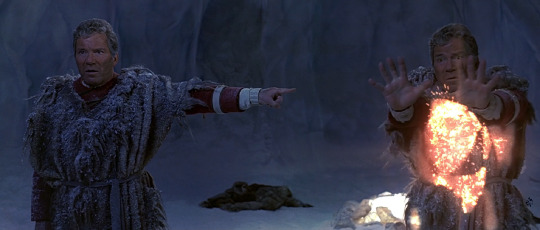
This week, it’s just me, myself, and I as A Star to Steer Her By is having a 2-for-1 sale of all the doppelgängers, imitators, shapeshifters, and other character duplicates on Star Trek. Whether it be a mistaken identity, an existential crisis, or some kind of cloning accident gone wrong, leave it to science fiction to turn the art of the soliloquy into a dialogue. But giving actors the opportunity to act across from themself makes for such a fun sight gag, depending on how well the compositing holds up.
We’re not even including all the mirror universe doubles running around (that can wait for another day), and this is still going such a long list that I’m going to have to break it into two posts because we get progressively looser and looser with the definition of doppelgänger, so check out batch one below and listen to our replicants on this week’s podcast episode (discussion at 1:08:06). Check out Part Two here! What can we say: two heads are better than one.
[Images © CBS/Paramount]
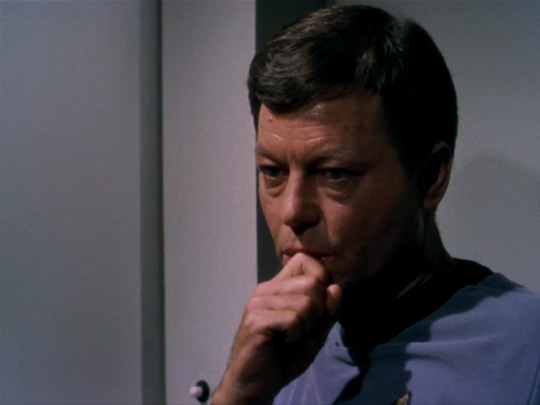
“The Man Trap”
We start things off really early in the canon with the very first released episode of TOS, when the technology to show duplicates on screen wasn’t there yet. Some clever cuts, scene transitions, and never having the M-113 creature in the same shot with the person they were impersonating certainly helped. We love us some salt vampire, so it’s a good way to start the show off with a lot of shape changing!
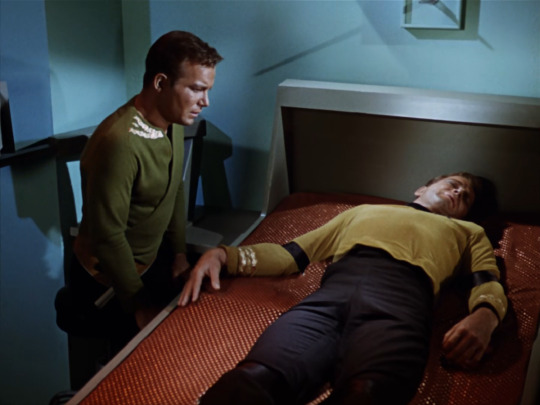
“The Enemy Within”
Certainly one of the most infamous double-Kirk instances (and there are a lot!) is in the Jekyll-and-Hyde allegory “The Enemy Within,” in which the captain is literally duplicated and forced to reunify himself. Again, we’re mostly treated to a TON of watching Shatner and his stunt double, but there’s a brief moment when we have our first onscreen pair! We’re Captain Kirk!
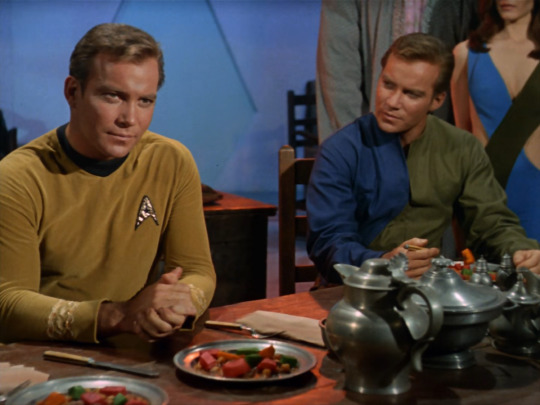
“What Are Little Girls Made of?”
Yet another double Kirk just two episodes later, and still not the last time either. The composite work to get two Shatners in the same shot is the most extensive yet, when the android copy of Kirk is created, and you know what? It’s not bad! This episode gets two Kirks up!
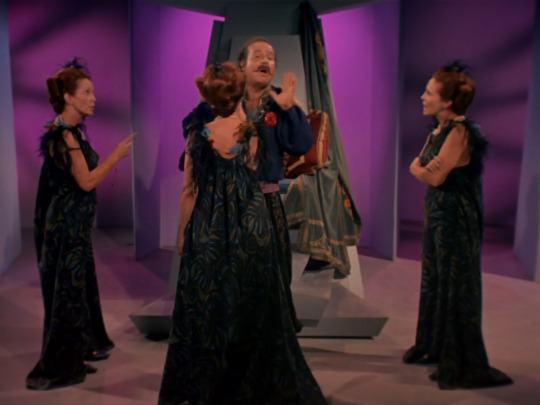
“I, Mudd”
Next season, we get a ton of doubling up when we go to Mudd’s planet of androids. While most of them are just twin actors to make things slightly easier, we definitely get a whole ton of Stellas! Harcourt’s got another thing coming because we know there are at least 500 copies of his nagging wife, all ready to tear him a new one!
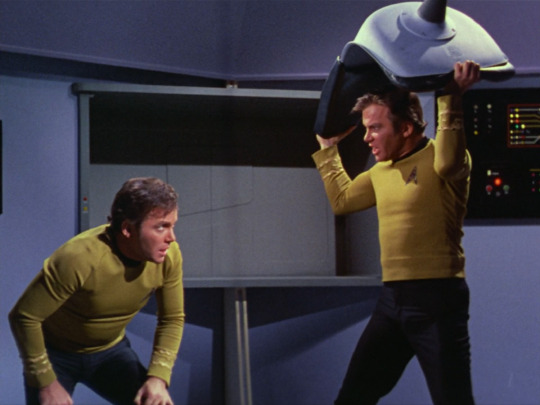
“Whom Gods Destroy”
We’re back to multiple Kirks when Garth of Izar proves he can shapeshift into anybody he wants. This episode is epic for its over-the-top Shatner acting, but also deserves some praise for a Kirk-on-Kirk fight scene that holds up pretty well!

“Yesteryear”
You’re going to see a handful of character doubles caused by meeting oneself during a time travel incident in this list, and the first (but not the last) involves meeting oneself as a child. Young Spock remains oblivious about the identity of his cousin from afar who’s trying earnestly to amend the timeline broken by those fools playing willy nilly with the Guardian of Forever.

“The Survivor”
You’d think that using the animated medium would allow for more scenes that would be unfeasible in live action filming, but alas. When it should be intrinsically possible to have a whole bunch of Kirks running around when our Vendorian friend takes on his shape, we never get them in the same shot! What a waste of the whole format (you know, like that whole series).

“The Infinite Vulcan”
Somehow, the very next episode in the animated show gives us exactly what we want. Two Spocks who interact and are in the same shot together. Sure, one of them is a giant for no particular reason, but that’s at least doing something new and different with the animation that we couldn’t do on the original show. And I’m counting that giant Apollo scene from “Who Mourns for Adonais?”

The Motion Picture
Sure, the original Ilia is killed by the time we see her replacement in probe form, but it’s still a duplicate. And this duplicate is just like the real thing, even down to her eye moisture, as is pointedly shared with us if only to make us cringe even harder.

The Undiscovered Country
One final double Kirk to get out of the way, as the final of the TOS movies introduces us to Martia, a chameloid who can take on other beings’ shapes, including for our final Kirk-on-Kirk fight which is always a bowl of fun.

“We’ll Always Have Paris”
If you thought that was a lot of Shatners, get ready to see a ton of our Enterprise-D heroes throughout The Next Generation. Let’s start things off with a season one banger, with a time hiccup that makes the crew keep running into themselves from a few seconds out of sync.
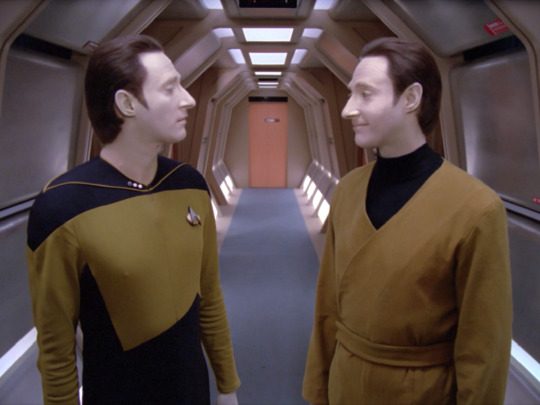
“Datalore,” “Brothers,” “Descent”
Data’s brother Lore may be his own character and is treated as such, but also being portrayed by Brent Spiner gives him the advantage of getting to pretend to be Data pretty much every time we see him, so I’m lumping all these together. And how can we fault the show for giving us as much onscreen Spiner as it possibly could, as we’ll see when we get to the more spoiler heavy batch next week?
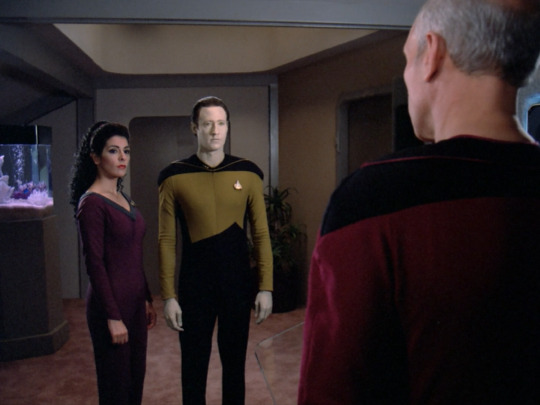
“Where Silence Has Lease”
The Nagilum doubles in this generally meh episode sadly never get to interact with their counterparts, but just come in and talk to Picard while in disguise to try to trick him into stopping his plan to self destruct the ship. There was some level of trickery afoot, so I’m mentioning it in this exhaustive list.
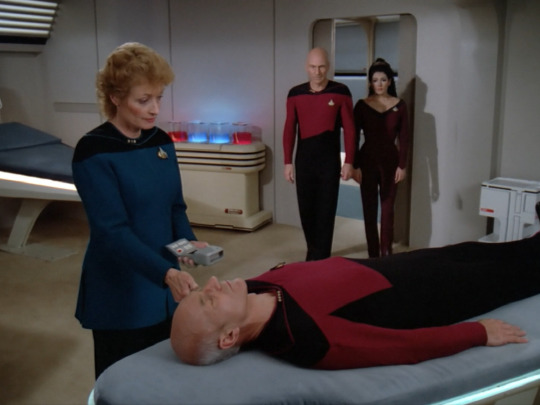
“Time Squared”
Here’s what we’re all here for though: dumb Picard. This episode gets to contain lots of great camera trickery and compositing to get two Picards in one shot, but one of them is there just to make acting hard for the other one. Or vice versa? It’s a little confounding, but it just makes me wonder so long after we covered the episode on the podcast: What did they do with the body?

“Up the Long Ladder”
The clone half of this episode is outshined by the absolutely bananas little Irish village half. But when you get past the chickens and utter thirst for Riker from that plot, the violation of having a bunch of people clone you without your consent is downright disturbing! I don’t blame Riker and Pulaski for wanting them dead, but boy, could this have been explored more and felt less like an afterthought in a way too busy episode!

“Allegiance”
Another double Picard, since captains probably get the most duplicating throughout their series, even more than O’Brien somehow. In this one, Picard has been captured because his abductors are testing some of humanity’s traits, while they take his place (and shape!) on the Enterprise to test the crew’s limits and how far Bev will go with him.

“Second Chances”
While many episodes that duplicate people through various means (the transporter, pretty often) effectively undo their work by the end, “Second Chances” has some lasting effects in that our second Riker, who IS in fact another Riker, gets to stick around and muddy the waters in his later episode and in some books. It’s a great concept but doesn’t get explored as much as it could; what I mean to say is Farscape does it better.
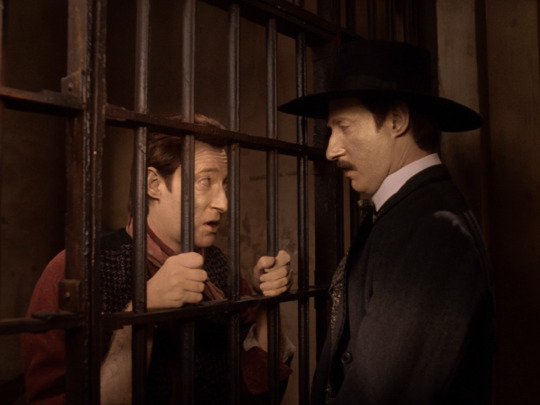
“A Fistful of Datas”
You’d just expect an episode about Data and the holodeck merging a little would have just a ton of Datas running around, and you know what? Needs more Datas! Sure, we get a handful of them, even in the same scene, and Brent somehow rocks a drag look, but if you’re gonna tease us with a fistful of our favorite android, then give us a whole fistful!

“Parallels”
Now we definitely get a whole fistful of Worfs in “Parallels,” when multiple dimensions start interacting with each other, including a super scruffy Riker who just wants out of his Borg-infested universe. This one gets some extra credit for its clever premise and a plot that’s unusually followable despite all the physics.
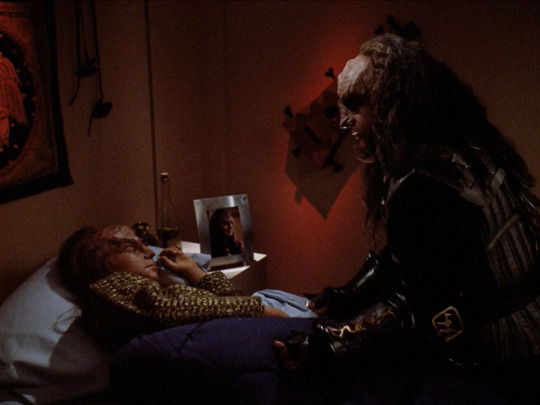
“Firstborn”
As if one Alexander isn’t enough, we put him in the room with his older, time-traveling self in “Firstborn.” Sure, it’s not like it’s a second version of the same actor playing across from themself, but it’s definitely a double character. And despite all the time traveling we do on this show, there’s less acting with yourself from another time than you’d think!

Nemesis
Oh boy, this asshole is back. Shinzon is a clone of Picard. Ish! Sure, Tom Hardy isn’t a literal copy of Patrick Stewart (his loss), but a clone is a clone, as this movie seems to want to force that fact down our throats. There’s also another double-Spiner when we meet Data’s dopey little brother B4, but do we need another screengrab of multiple Brents?

Yes. Yes, we do.
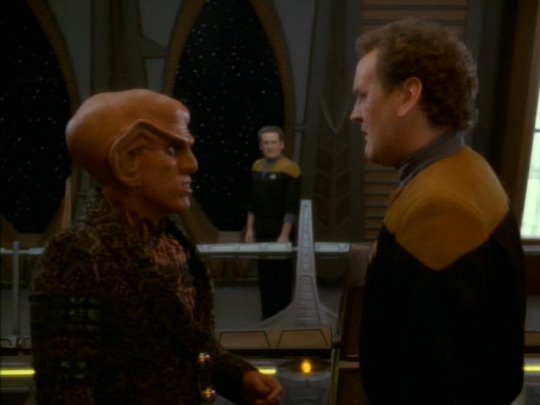
“Visionary”
Come Deep Space Nine times, there’re even newer ways to get the same character on screen with themself, starting obviously with Miles! “Visionary” is one of those time travel episodes that’s on the cusp on being too smart for its own good. Think about it too much and it falls apart, but we’re so excited by how many Mileses get killed that it’s AOK.

“Whispers”
And we’re not even done killing off different versions of Miles, this one a replicant who has no idea he’s not the real deal! It’s a good time watching the perfect copy that was made of the chief, right down to the way his wife treats him like a stranger and the existential crisis he has that is just so typically Miles O’Brien.
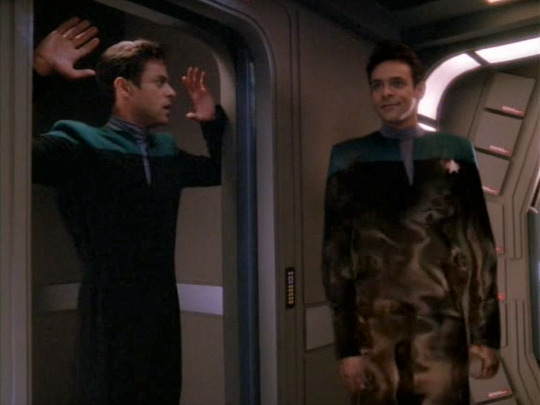
“The Adversary” et alia
I’m gonna just lump all the times we see Changelings running around in other people’s forms all over Deep Space Nine into one item in this list, mostly for my own sanity, and just partly because there’s almost never a way to prove who is or isn’t a Changeling in the background of any given scene. And as this Changeling pretending to be Bashir in “The Adversary” says, “We’re everywhere!”

“Doctor Bashir, I Presume?”
There’s another good double Bashir in “Dr. Bashir, I Presume?” and not only does it make for a good sight gag (holoBashir walking into a wall over and over again never fails to crack me up!) but it also drives the plot forward when daddums, whom we discussed in our Trek parenting post recently, somehow mistakes a vacant-eyed husk of a being for his flesh-and-blood son. Maybe Richard Bashir does belong a few rungs lower on the list…
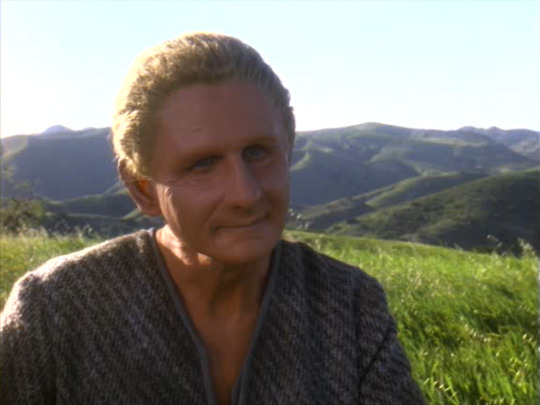
“Children of Time”
Sadly, we never see Gaian Odo, who got winked out of existence because his love for Kira outshone a whole population of the crew’s descendants, in the same room with the Odo we’re all familiar with. Normal timeline Odo spent the whole episode as a goo stuck in a breadmaker, so we really only got to know a version of him who got to make a Tuvix-level decision that not enough people give him shit for.
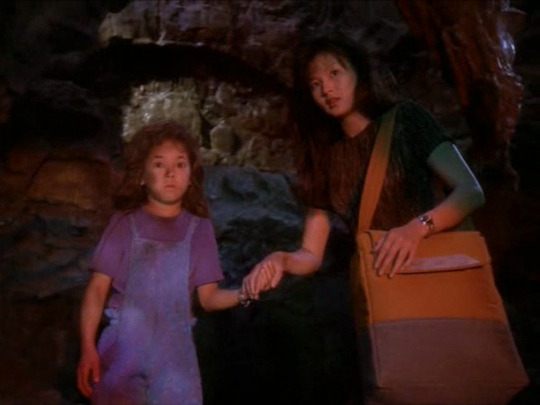
“Time’s Orphan”
If we counted the Spocks and Alexanders of different ages in “Yesteryear” and “Firstborn” respectively, then you’d better believe we’re gonna count feral Molly from “Time’s Orphan,” another time traveler who pops out of some kind of whatzit and meets themself as a child. All of them succeed in preventing their bad futures from happening, though Molly did fully expect to go live in the woods for the rest of her life.
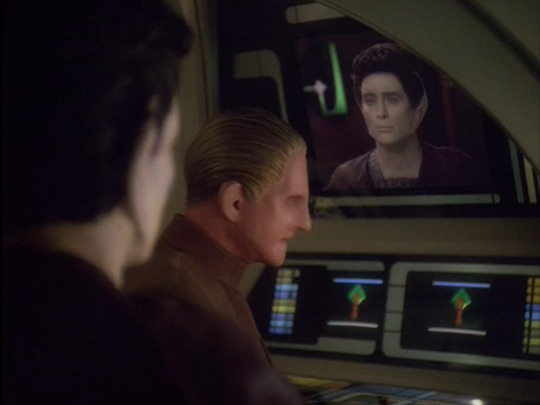
“Treachery, Faith, and the Great River”
We’d be remiss not to mention some of the best clones in all of Star Trek: the Vorta! We see a number of Weyouns throughout Deep Space Nine, but we get the most of them in one place in “Treachery, Faith, and the Great River,” with two of them activated at the same time. The more Jeffrey Combs, the better, I always say!
—
We’re at our image cap and only halfway through the list we came up with. Sorry, I did NOT expect there to be quite this many instances of character doubles in Trek, and that’s totally on me. Of COURSE good science fiction is going to make its characters confront themselves to learn whatever the lesson of the week is. Of course.
And our lesson of the week is we need another week, so check back to find out how many more changelings have infiltrated our ranks, keep following our Voyager watchthrough on SoundCloud or wherever you get podthings, double your fun on Facebook and Twitter, and remember: we’re everywhere!
#star trek#star trek podcast#podcast#doppelganger#shapeshifter#transporter accident#the original series#the animated series#the next generation#deep space nine#jeffrey combs
1 note
·
View note
Text
Property As a Service

Property as a solution is an organization version that permits individuals to gain on-demand access to commercial residential or commercial properties and also solutions. Instances of realty as a solution consist of exclusive gym, on-site day spas, and electrical cars and truck charging stations. A real estate representative is a person who takes care of the sales, settlements, and listing of buildings in behalf of clients.
The Mulmur realtors keep clients educated concerning market conditions and are in charge of the legal facets of a transaction. Certified real estate specialists can assist with funding spins as well as various other sales contract complexities. Brokers are firms that work to earn a payment by locating and matching purchasers with vendors. Realty compensations vary extensively. For example, a full-service broker may gain between 5 and also 6 percent of the residential property's sale price. Compensations can likewise be divided amongst a number of brokers that join the deal.
Throughout the negotiation procedure, a broker's fee can be paid by either the customer or the seller. There are 2 main types of realty representatives: those who represent the interests of the buyer and also those that stand for the interests of the seller. Usually, a vendor's agent is employed by a homeowner to market their residential property. An agent does not have to be an accredited real estate professional to do this duty.
Nevertheless, the real estate agent is a fiduciary who owes a task of commitment to the homeowner. In several states, a property agent must finish proceeding education in order to keep his/her license. In The golden state, as an example, a property expert needs to finish 45 hours of continuing education and learning every four years. As component of his/her need, he or she should take a 15-hour applied property principles program.
The course must be interactive. Deal brokers are people that assist the events to a purchase however do not have the same responsibilities as a real estate representative. The New Tecumseth realtors aid the parties to a deal to make a purchase as smooth as possible. To become a broker, a person needs to complete a pre-license program including 90 hrs of education and learning. Numerous remarkable groups are involved in advertising the real estate market. Some instances of these organizations are the National Organization of Realtors (NAR), the Realty Service Allies Committee (RESP), and also the Greater Syracuse Organization of REALTORS (GSAR). GSAR is the leading real estate organization in Central New york city.
It gives education, tools, and also sources to its participants. Realty as a solution, or REaaS, is an industry version that is being taken on by numerous asset classes. It is a design that integrates the use of electronic advertising and social networks with the solutions of a realty specialist to advertise a property to prospective buyers.
This approach varies from building to building, yet the objective is to advertise a residential or commercial property to a wider target market as well as to produce more rate of interest. The Realty Settlement Procedures Act, or RESPA, is a regulation that guarantees ample notification of the Realty negotiation procedure. It puts on both residential and also business transactions. Normally, a broker is needed to inform all parties involved in the transaction of the nature of his or her partnership with them. Here is a post with a general information about this topic, check it out: https://en.wikipedia.org/wiki/Real_estate_agent.
0 notes
Text
Working With a Lawyer instructions Part 2
Please send to Part-1 regarding this 2-part content to read concerning the role of your lawyer in addition to why it is definitely important to have got a strong lawyer-client working relationship with your attorney.
The adhering to points will include to developing a strong work connection with the lawyer in addition to lead you to more successful results in your lawsuit.
First and even Foremost, Give you a Lawyer the Whole Story - As soon as you seek the services of your lawyer, simply tell him or her everything that is related to your own case and provide him or her collectively relevant record, even those facts and details that you simply think are harming to your case. Lawyers have recently been trained to sort and sort through the details you supply and determine exactly what information is useful intended for your case and exactly what isn't. Every reality and detail may be crucial to your current case. Facts which usually may not appear important to you may have serious legal implications. Your lawyer might be able to use a simple fact or even a document you thought was trivial as the basis for a creative lawful argument. And when a thing might harm your case, your legal professional will have sufficient time to prepare protective maneuvers.
Respond Rapidly - This factor alone will surely damage the relationship in between you and your current lawyer and practically always hurt the case - that is if your response is involving an irresponsible characteristics. Lawyers often have to function under quite tight deadlines. Your own prompt response to be able to your lawyer's requests will insure those deadlines are fulfilled and your circumstance is flowing effortlessly. Your prompt reply will also provide your lawyer enough time to get over your details in addition to better prepare his / her next step. In Check over here are certainly not in a position to respond rapidly for one reason or an additional, let your lawyer know immediately. Your own lawyer might get able to get an extension of moment from your opponent or the court, or perhaps rearrange other things to accommodate the delay.
Cooperation instructions During the program of your circumstance, your lawyer will certainly ask you with regard to particular documents or certain facts relevant to your lawsuit. Rather than making your legal professional hunt down these details, remember that if you're the one that is undertaking this legal action. In many instances you might have substantially easier access in order to the information relevant to be able to your case than any one different. By cooperating along with your lawyer in gathering the important specifics for winning your case, you will not only help your circumstances, but include your lawyer devote less time, which will reduce your legal cost.
At some sort of beginning of the legal action, your lawyer may ask you in order to jot down an overview of events leading up to the lawsuit. Ensure that what you create is extremely accurate - only known details. Your lawyer will base your states and defenses on this information.

Preparedness - Never forget that will your attorney's period is your funds. Better prepared a person are, less of your budget your own legal matter can cost you. Any time you talk with the lawyer, have with you already ready written summary or perhaps detailed notes teaching your problem or perhaps questions; bring copies of documents, words as well as other correspondence pertaining to your case. Also, provide the lawyer using a listing of all brands, addresses, and mobile phone numbers of individuals active in the case. This kind of will avoid unwanted delays. Be mainly because brief as you can inside all interviews together with your lawyer, and adhere to business. At the particular rate that a person are charged regarding calls and conferences, socializing gets expensive.
Keep Your Attorney Informed - Your own lawyer can function only with the data that you offer him or the girl with. Failure in order to keep your lawyer updated with information about any fresh developments strongly related your case may be catastrophic to your final outcome. Tell your lawyer immediately of adjustments or new information that may affect the case. On typically the same note, possessing back information could as well stop your lawyer by obtaining your desired results. For this reason this is very significant for you to be truthful and complete in regards to the information of your condition.
Keep Your Schedule Flexible - Right now there are certain legitimate events in which often you must participate. Very often these kinds of events are slated weeks or actually months in advance. Most of these kinds of events can become rescheduled to accommodate the schedule as long as your own lawyer knows throughout advance. But, be prepared to change your strategies in case you must since sometimes a court may insist upon holding the appointed meeting whether your current schedule permits or perhaps not.
Various Other Factors
- Carry your lawyer's legitimate advice seriously. When an attorney gives legal services, the attorney might be liable for malpractice if the advice will be wrong. For that will reason attorneys are usually hesitant to give legal advice and show themselves to responsibility without first looking at the most current legitimate facts. And this takes time. That's the reason why they charge the fee for lawful advice because that they give you facts in addition to not an impression. So when your attorney gives you legitimate advice strongly related your legal issue, a person better follow up onto it because it can a real professional.
- Many legal problems are unable to be explained simply. We stay in a complex society with the extremely complex legitimate system. So in the event that you miss a thing that your lawyer says, don't simply take it as is - ask intended for an explanation. You need to inquire your lawyer to be able to explain it with a non-legal lingo.
- Respect your attorney's time. Stay away from phoning repeatedly related to every single question that comes upon your mind. First of all you will shell out for time expended on the cell phone. Second, your lawyer has other clients who require consideration too. So, it would be in the best interest and is usually even more cost-effective to question several questions in a time, as opposed to calling each moment a question develops. By all signifies, do not wait to call your lawyer in case your question is usually so critical that that will affect the case significantly.
-- Avoid legal debate. If you at times believe that your attorney is not quite dealing with your legal matter how we think this individual or she will be suppose to, try to first gain an understanding simply by asking your attorney questions about his or her course of motion instead of directly engaging into a debate. But if you really need to engage into some sort of debate because most likely certain that you know it better, check the specifics before you begin the discussion. You may want to embarrass yourself when your lawyer proves a person wrong. Lawyers have extensive legal coaching. Their actions at times may appear weird to be able to you however they may possibly be just typically the right move for obtaining positive results regarding your legal matter.
- Respect the lawyer's pride. A single common characteristic amongst all lawyers is usually their strong pride. That comes together with their profession. At times it may feel that this pride boundaries on arrogance or perhaps egotism. Maybe so. But, so what? Actually, this have may win your case. It gives lawyers more confidence even if they will lack the encounter. Therefore , treat your lawyer with respect and he or your woman will do more than their very best to get you your desired benefits.
- Your legal professional is a qualified. As such, tackle your lawyer in the professional way in your communication, no matter if written or dental. You will much much better results. For the instance, which of the a couple of sentences do you consider would get you far better response by your lawyer? "We need to talk today because my condition is not moving just how I need and I want to see what you're doing wrong" - or even - "I might appreciate if we could schedule 35 minutes of your time to be able to discuss the present developments of the case. " An individual get the actual.
-- Communicate your goals quite clearly. Inform your legal professional exactly what your expectations are from the legal matter. In the event you deliver unclear image to your legal professional, they wouldn't understand how to fixed the "Theory of the Case. " This is definitely the first and most important step that will assistance every step of the trial. Your own lawyer needs to know exactly what their case is truly about and set up your final aim accordingly.
- Be on coming back appointments, whether in judge or for anything at all related to your own case.
- Have patience and understand that legal problems need as well as research.
: Respond promptly to your lawyer's requests and phone calls.
-- And of training course, pay your legal fees promptly since agreed within the charge arrangement you manufactured.
0 notes
Text
Role of Your Lawyer
Read about the role of your lawyer and why it is important to have a strong lawyer-client working relationship with your attorney. The following points will add to developing a strong work relationship with your lawyer and lead you to more successful results in your lawsuit. You can also take information from VRM Lawyers.

First and Foremost, Give Your Lawyer the Whole Story: As soon as you hire your lawyer, tell him or her everything that is related to your case and provide him or her with every relevant document, even those facts and details that you think are damaging to your case. Lawyers have been trained to sift and sort through the information you provide and determine what information is useful for your case and what isn't. Every fact and detail could be crucial to your case. Facts which may not seem important to you may have serious legal consequences. Your lawyer might be able to use a fact or a document you thought was unimportant as the basis for a creative legal argument. And if something might harm your case, your lawyer will have plenty of time to prepare defensive maneuvers.
Respond Promptly: This factor alone will certainly damage the relationship between you and your lawyer and almost always hurt your case - that is if your response is of an irresponsible nature. Lawyers often have to work under very tight deadlines. Your prompt response to your lawyer's requests will insure those deadlines are met and your case is flowing smoothly. Your prompt response will also give your lawyer enough time to go over your information and better prepare his or her next step. If you are not able to respond quickly for one reason or another, let your lawyer know immediately. Your lawyer might be able to get an extension of time from your opponent or the court, or rearrange other matters to accommodate the delay.
Cooperation: During the course of your case, your lawyer will ask you for particular documents or certain facts relevant to your lawsuit. Instead of making your lawyer hunt down those details, remember that you're the one who is undertaking this legal action. In most instances you have much easier access to the information relevant to your case than any one else. By cooperating with your lawyer in gathering the important details for winning your case, you will not only help your situation, but have your lawyer spend less time, which will reduce your legal cost.
At a beginning of a lawsuit, your lawyer may ask you to write down a summary of events leading up to the lawsuit. Make sure that what you write is extremely accurate - only known facts. Your lawyer will base your claims and defenses on this information.
Preparedness: Always remember that your attorney's time is your money. Better prepared you are, less money your legal matter will cost you. When you meet with your lawyer, have with you already prepared written summary or detailed notes outlining your problem or questions; bring copies of all documents, letters and other correspondence relating to your case. Also, provide your lawyer with a list of all names, addresses, and telephone numbers of persons involved in the case. This will avoid unnecessary delays. Be as brief as possible in all interviews with your lawyer, and stick to business. At the rate that you are charged for calls and conferences, socializing gets very expensive.
Keep Your Lawyer Informed: Your lawyer can work only with the information that you provide him or her with. Failure to keep your lawyer updated with information about any new developments relevant to your case can be disastrous to your final outcome. Tell your lawyer immediately of changes or new information that might affect your case. On the same note, holding back information can as well prevent your lawyer from obtaining your desired results. That's why it is very important for you to be truthful and complete about the facts of your situation.
Keep Your Schedule Flexible: There are certain legal events in which you must participate. Very often these events are scheduled weeks or even months in advance. Most of these events can be rescheduled to accommodate your schedule only if your lawyer knows in advance. But, be prepared to change your plans if you must because sometimes a judge may insist on holding the scheduled meeting whether your schedule permits or not.
Various Other Points: Take your lawyer's legal advice seriously. When an attorney gives legal advice, the attorney may be liable for malpractice if the advice is wrong. For that reason attorneys are hesitant to give legal advice and expose themselves to liability without first checking the most current legal facts. And that takes time. That's why they charge a fee for legal advice because they give you facts and not an opinion. So when your lawyer gives you legal advice relevant to your legal issue, you better follow up on it because it's a real deal.
Many legal problems cannot be explained simply: We live in a complex society with an extremely complex legal system. So if you don't understand something that your lawyer says, don't just take it as is - ask for an explanation. Maybe you need to ask your lawyer to explain it with a non-legal jargon.
Respect your attorney's time: Avoid phoning repeatedly about every single question that comes on your mind. First of all you will pay for the time spent on the phone. Second, your lawyer has other clients who require attention too. So, it would be in your best interest and is usually more cost-effective to ask several questions at a time, rather than calling each time a question arises. By all means, do not wait to call your lawyer if your question is so important that it will affect your case significantly.
Avoid legal debate: If you sometimes feel that your lawyer is not quite handling your legal issue the way you think he or she is suppose to, try to first gain an understanding by asking your lawyer questions about his or her course of action instead of directly engaging into a debate. But if you really must engage into a debate because you're certain that you know it better, check the facts before you start the discussion. You don't want to embarrass yourself when your lawyer proves you wrong. Lawyers have extensive legal training. Their actions sometimes may seem weird to you but they may be just the right move for obtaining positive results for your legal issue.
Respect your lawyer's pride: One common characteristic amongst all lawyers is their strong pride. That comes with their profession. Sometimes it may feel that this pride borders on arrogance or egotism. Maybe so. But, so what? This feature may win your case. It gives lawyers more confidence even if they lack the experience. So, treat your lawyer with respect and he or she will do more than their very best to get you your desired results.
Your lawyer is a professional: As such, address your lawyer professionally in your communication, whether written or oral. You'll get much better results.
Communicate your goals very clearly: Tell your lawyer exactly what your expectations are from your legal matter. If you deliver the unclear picture to your lawyer, he or she wouldn't know how to set the "Theory of the Case." This is the first and most important step that will support every step of the trial. Your lawyer needs to know exactly what your case is truly about and establish your final objective accordingly.
Be on time for appointments, whether in court or for anything related to your case. Be patient and understand that legal problems require time and research. Respond promptly to your lawyer's requests and phone calls. And of course, pay your legal fees promptly as agreed in the fee arrangement you made.
This article has done its best to give you useful, informative, and accurate information. This article does not represent nor replace the legal advice you need to get from a lawyer, or other professional if the content of the article involves an issue you are facing. Laws vary from state to state and change from time to time. Always consult with a qualified professional before making any decisions about the issues described in this article.
1 note
·
View note
Text
Dealing with a Lawyer instructions Part 2
Please send to Part-1 regarding this 2-part content to read about the role associated with your lawyer plus why it is definitely important to have a strong lawyer-client functioning relationship with your attorney.
The adhering to points will add to developing a new strong work connection together with your lawyer plus make you more productive results in your lawsuit.
First in addition to Foremost, Provide an Attorney the Whole Story - As quickly as you retain the services of your lawyer, simply tell him or her exactly what is related to your current case and offer him or your ex jointly relevant file, even those details and details that you just think are damaging to your circumstance. Lawyers have recently been trained to sort and sort through the info you offer and determine exactly what information is advantageous regarding your case and what isn't. Every simple fact and detail might be crucial to your case. Facts which often may not seem important to you could have serious legal consequences. Your lawyer might be able to use a reality or a document a person thought was unimportant as being the basis for a creative legal argument. In case some thing might harm the case, your attorney will have sufficient time to prepare protecting maneuvers.
Respond Rapidly - This factor alone will certainly damage the relationship involving you and your lawyer and almost always hurt your case - of which is if your own response is involving an irresponsible nature. Lawyers often have got to function under quite tight deadlines. Your own prompt response in order to your lawyer's requests will insure all those deadlines are met and your case is flowing effortlessly. Your prompt reaction will also give your lawyer sufficient time to get over your details plus better prepare his / her next step. When you are not capable to respond swiftly for some reason or an additional, let your legal professional know immediately. Your current lawyer might get able to to have extension of moment out of your opponent or even the court, or even rearrange other concerns to accommodate the particular delay.
Cooperation instructions During the study course of your circumstance, your lawyer will ask you for particular documents or perhaps certain facts strongly related your lawsuit. As opposed to making your lawyer hunt down these details, remember that most likely the one who is undertaking this lawful action. In many instances you might have very much easier access to be able to the details relevant to be able to your case as compared to any one else. By cooperating along with your lawyer in collecting the important specifics for winning your current case, you can not only support your position, but have got your lawyer invest less time, which will reduce your legal cost.

At a new beginning of any legal action, your lawyer may ask you to note down a synopsis of events prior to the lawsuit. Make sure that what you create is quite accurate - only known details. Your lawyer may base your states and defenses about this information.
Readiness - Never forget of which your attorney's moment is your money. Better prepared a person are, less cash your current legal matter will cost you. Click here for more info discuss with the lawyer, have together with you already well prepared written summary or perhaps detailed notes teaching your problem or even questions; bring copies of most documents, letters along with other correspondence related to your circumstance. Also, provide the lawyer which has a listing of all titles, addresses, and telephone numbers of people active in the case. This particular will avoid needless delays. Be as brief as you possibly can in all interviews along with your lawyer, and stay with business. At the rate that an individual are charged regarding calls and meetings, socializing gets very costly.
Keep Your Lawyer Informed - Your current lawyer can work only with all the information that you offer him or your ex with. Failure to be able to keep your attorney updated with info about any new developments tightly related to the case can be catastrophic to your final outcome. Tell your lawyer immediately of adjustments or new information that might affect the case. On the particular same note, holding back information may as well stop your lawyer coming from obtaining your wanted results. Therefore this is very significant for you to be truthful and even complete concerning the details of your condition.
Keep Your Timetable Flexible - Generally there are certain legal events in which often you must get involved. Very often these events are scheduled weeks or also months in advance. Most of these types of events can be rescheduled to accommodate your own schedule only if the lawyer knows in advance. But, anticipate to change your ideas if you must due to the fact sometimes a tell may insist upon holding the appointed meeting whether the schedule permits or perhaps not.
Various Other Points
- Carry your lawyer's legitimate advice seriously. When an attorney gives legal services, the attorney might be liable for negligence when the advice is usually wrong. For of which reason attorneys usually are hesitant to supply legal advice and expose themselves to legal responsibility without first checking out the most current lawful facts. And that requires time. That's exactly why they charge some sort of fee for lawful advice because these people provide you with facts and even not a viewpoint. So when your lawyer gives you legitimate advice relevant to your own legal issue, you better follow up upon it because it can an authentic studio.
- Several legal problems can not be explained simply. We are now living in a new complex society by having an extremely complex legitimate system. So in case you miss a thing that your legal professional says, don't take it as is - ask regarding an explanation. You need to question your lawyer to be able to explain it using a non-legal lingo.
- Respect your own attorney's time. Stay away from phoning repeatedly on the subject of every single query that comes in your mind. To begin with you will pay for time put in on the cell phone. Second, your lawyer has other consumers who require interest too. So, this would be in your best interest plus is usually more cost-effective to request several questions in a time, instead of calling each period a question develops. By all means, tend not to wait in order to call your attorney should your question is certainly so critical that that will affect your own case significantly.
-- Avoid legal discussion. If you occasionally believe that your lawyer is simply not quite managing your legal matter the way you think he or she or she is definitely suppose to, consider to first gain an understanding by asking your legal professional questions about his / her course of motion instead of directly engaging into the debate. But if you really need to engage into a debate because if you're certain that you know this better, look into the information before you start the topic. You avoid want to bug yourself when your own lawyer proves an individual wrong. Lawyers include extensive legal education. Their actions at times might appear weird to be able to you nonetheless they may be just the particular right move intended for obtaining good success regarding your legal concern.
- Respect your lawyer's pride. A single common characteristic amidst all lawyers is usually their strong pride. That comes along with their profession. At times it may think that this pride boundaries on arrogance or perhaps egotism. Maybe and so. But, so exactly what? Actually, this feature may win your case. It gives lawyers more self-confidence even if they lack the knowledge. Therefore , treat your current lawyer with value and he or she will do more than their own very best to help you get your desired benefits.
- Your legal professional is a qualified. As such, tackle your lawyer in the professional way within your communication, whether written or dental. You will get much much better results. To have an example, which of those 2 sentences do you consider would likely get you much better response by your own lawyer? "We require to talk right now because my case is not shifting just how I need and I want to see what you're carrying out wrong" - or - "I might appreciate if all of us could schedule 30 minutes of your time to discuss the present developments of my case. " An individual get the point.
- Communicate aims very clearly. Tell your attorney exactly what the expectations are out of your legal matter. In case you deliver unclear image to your lawyer, he or she wouldn't know how to set the "Theory of the watch case. " This is usually the first in addition to most important phase that will support all the trial. Your own lawyer needs in order to know exactly what your case is truly about and establish your final aim accordingly.
- Be on time for visits, whether in judge or for anything related to your case.
- Show patience and understand of which legal problems require some research.
-- Respond promptly in order to your lawyer's demands and phone calls.
: And of study course, pay your lawful fees promptly as agreed inside the cost arrangement you made.
0 notes
Text
Working together with a Lawyer instructions Part 2
Please recommend to Part-1 of this 2-part article to read regarding the role involving your lawyer plus why it will be important to have a very strong lawyer-client performing relationship with your own attorney.
The pursuing points will include to developing the strong work partnership along with your lawyer and even lead you to more productive results in your current lawsuit.
First in addition to Foremost, Give you a Lawyer the Whole History - As shortly as you retain the services of your lawyer, simply tell him or her exactly what is related to your case and give him or your ex collectively relevant record, even those information and details which you think are harming to your case. Lawyers have recently been trained to sort and sort via the info you provide and determine just what information is useful intended for your case and what isn't. Every fact and detail could possibly be crucial to your own case. Facts which often may not seem to be important to you might have serious legal outcomes. Your lawyer could possibly use a fact or a document you thought was unimportant since the basis for a creative legitimate argument. And if something might harm your case, your legal professional will have the required time to prepare defensive maneuvers.
Respond Immediately - This component alone will undoubtedly damage the relationship among you and your lawyer and nearly always hurt your own case - that is if your current response is regarding an irresponsible characteristics. Lawyers often possess to function under extremely tight deadlines. The prompt response to your lawyer's desires will insure all those deadlines are achieved and your situation is flowing smoothly. Your prompt reaction will also give your lawyer sufficient time to go over your details and better prepare his or her next step. In the event that you are not necessarily in a position to respond swiftly for some reason or an additional, let your attorney know immediately. Your own lawyer might be able to get an extension of moment from your opponent or perhaps the court, or perhaps rearrange other concerns to accommodate typically the delay.
Cooperation -- During the training course of your situation, your lawyer may ask you intended for particular documents or perhaps certain facts highly relevant to your lawsuit. As opposed to making your legal professional hunt down those details, understand that you aren't the one who will be undertaking this legal action. In many instances you could have much easier access to the details relevant to be able to your case compared to any one else. By cooperating together with your lawyer in gathering the important particulars for winning your case, you may not only support your circumstances, but possess your lawyer devote less time, that may reduce your legal cost.
At the beginning of the court action, your lawyer may well ask you to be able to write down a synopsis of events prior to the lawsuit. Make certain that what you compose is quite accurate -- only known details. Your lawyer will base your promises and defenses on this information.
Readiness - Bear in mind of which your attorney's time is your funds. Better prepared an individual are, less of your budget your current legal matter will certainly cost you. When you meet with your current lawyer, have with you already prepared written summary or even detailed notes outlining your problem or even questions; bring reports of all documents, characters as well as other correspondence related to your situation. Also, provide the lawyer using a list of all names, addresses, and mobile phone numbers of persons involved in the case. This kind of will avoid unneeded delays. Be just as brief as you possibly can within all interviews with your lawyer, and follow business. At the particular rate that you are charged regarding calls and conferences, socializing gets extremely expensive.

Keep Your Attorney Informed - Your current lawyer can work only with the information that you provide him or the girl with. Failure in order to keep your legal professional updated with info about any fresh developments relevant to your own case can be devastating to your end result. Tell your legal professional immediately of changes or new details which may affect your own case. On the same note, having back information may as well stop your lawyer by obtaining your wanted results. That's why this is very significant for you in order to be truthful and even complete regarding the details of your scenario.
Keep Your Timetable Flexible - Right now there are certain lawful events in which usually you must participate. Very often these events are slated weeks or even months in progress. Most of these events can become rescheduled to accommodate your own schedule only when your lawyer knows within advance. But, be prepared to change https://www.johnrobinlaw.com/18-wheeler-accident-in-louisiana-today in case you must mainly because sometimes a judge may insist on holding the appointed meeting whether your own schedule permits or not.
Various Some other Factors
- Take your lawyer's legal advice seriously. When an attorney gives legal services, the attorney may be liable for negligence when the advice is usually wrong. For of which reason attorneys are hesitant to give legal advice and reveal themselves to responsibility without first looking at the most up to date lawful facts. And that requires time. That's the reason why they charge the fee for legitimate advice because they will give you facts plus not a viewpoint. Thus when your attorney gives you lawful advice tightly related to your own legal issue, you better follow upwards on it because it can a real professional.
- A lot of legal problems are not able to be explained basically. We stay in some sort of complex society with the extremely complex legitimate system. So in the event that you don't understand a thing that your attorney says, don't take it as is - ask with regard to an explanation. You may need to request your lawyer in order to explain it with a non-legal lingo.
- Respect your current attorney's time. Prevent phoning repeatedly related to every single question that comes on your mind. Firstly you will shell out for enough time expended on the telephone. Second, your attorney has other clients who require attention too. So, that would be inside your best interest plus is usually more cost-effective to inquire several questions from a time, instead of calling each time a question develops. By all signifies, never wait to be able to call your attorney if the question is definitely so important that it will affect your case significantly.
instructions Avoid legal argument. If you sometimes feel that your lawyer is just not quite dealing with your legal matter the method that you think this individual or she is definitely suppose to, attempt to first increase an understanding by simply asking your lawyer questions about his or her course of actions instead of straight engaging into a new debate. But in the event that you really need to engage into a debate because you're certain that you understand this better, examine the information before you start the topic. You may want to embarrass yourself when your own lawyer proves you wrong. Lawyers have got extensive legal education. Their actions sometimes may appear weird to be able to you but they may be just the particular right move intended for obtaining results regarding your legal issue.
- Respect your own lawyer's pride. One common characteristic among all lawyers is certainly their strong take great pride in. That comes with their profession. At times it may think that this pride edges on arrogance or even egotism. Maybe thus. But, so exactly what? Actually, this feature may win the case. It provides lawyers more confidence even if that they lack the encounter. Therefore , treat your lawyer with admiration and or the girl will get around rather than their very best to truly get you your desired results.
- Your attorney is a specialized. As such, tackle your lawyer in the professional way inside your communication, no matter if written or oral. You will much better results. For an example, which of those two sentences do you consider would certainly get you much better response by your own lawyer? "We require to talk today because my claim is not relocating the way I want and I need what you're doing wrong" - or perhaps - "I would likely appreciate if all of us could schedule thirty minutes of your time to be able to discuss the current developments of our case. " You get the actual.
-- Communicate aims really clearly. Tell your legal professional exactly what your own expectations are from the legal matter. If you deliver unclear image to your legal professional, he / she wouldn't understand how to set the "Theory of the watch case. " This is the first in addition to most important phase that will assistance every step of the trial. The lawyer needs in order to know exactly what your case is genuinely about and set up your final objective accordingly.
- Become on coming back sessions, whether in court or for anything at all related to your current case.
- Show patience and understand of which legal problems need time and research.
: Respond promptly to be able to your lawyer's requests and phone calls.
- And of program, pay your legal fees promptly because agreed inside the price arrangement you manufactured.
0 notes
Text
Unknown Facts About Facebook Dating
#1 TRUSTED DATING APP 2020 Study of 1,067 Participants from the US, UK, Canada and Australia EVERY 14 Mins, SOMEONEFINDS LOVE ON EHARMONY eharmony consumer data Greatest Top quality Going out with Swimming pool 2018 Survey of 1,616 U.S. Singles Our dating internet site has helped millions of couples locate passion OVER 2 MILLION HAVE Discovered Passion … might you be upcoming?.
51% MEN49% WOMEN Quality suit for everyone. A quality male player, therefore I'll leave behind that for yet another write-up. A good-looking gamer (that I comprehend) is a wonderful fit for me. But that must not interfere with what I mention or what's stated listed below. Thus yeah? All three variables are there. I'm a fella (or a individual not) and I carry out that well.
Internet site MOST Most likely TO LEAD TO Delighted Partnerships* … the ideal one might be waiting for you! It is rather achievable to obtain into a relationship with an Oriental female within the context of an already sizable Oriental family members (as presented in Number 1). In this instance, in many cases one of the parents is also a strong companion. If one is a solid companion one of a number of spouses may exist, and in some instances, some may likewise be weakened.
2.3 MILLION MESSAGES SENT WEEKLY See who desires to speak to you! • A overall of 40,000 folks have signed up in less than 24 hours. Get details. • Our application has more than 10 millions downloads, each one producing billions of monthly perspectives. • Our information facility right now has more than 16,500 clients; we possess over 5,000 information pages.
Presenting: A new eharmony encounter brand-new eharmony take in Your search for a wonderful partnership has never ever been much easier along with groundbreaking overhaul of the eharmony you know and count on. Currently you can find out an experienced and trusted staff of dedicated experienced experts through looking for a partner along with the kind of commitment, power, and adaptability you've come to anticipate from our very regarded, expertly trained, qualified experts.
Receive A Reptile PEEK: Being compatible matters What happens when you apply 20+ years of take in and analysis to our participants’ needs? The community is a natural extension of the crew and they contribute to molding and strengthening our community. Our vision is to get more excellent gamers on the map and to be the best feasible spot for them – that's specifically what was performed during their whole opportunity right here.
Because Key Reference uses our distinct Compatibility Matching System. This makes certain that eharmony works with all applications written using the present Compatibility Matching System. We look ahead to being able to create a device for integrating eharmony along with your apps! We're fired up to welcome Kornet's new eHealth (likewise recognized by WebOS as eHealth) that sustains both desktop and mobile phone gadgets.
That’s why every 14 moments, someone locates affection on eharmony. It's like my father's not certainly there as his dad (although he might!). No, you can't receive a sense of how zealous the female truly thinks you are because the whole time you're just resting certainly there only not touching her. The last point many folks wanna recognize is that it took him like 1 to 3 years merely to recognize she's only curious in him thus considerably.
Good songs, only like you They’re wise, truthful and significant about finding passion. If people don't prefer you or your partnership, at that point look to them for an eye-catching individual with the exact same character. Also if they aren't, in terms of going out with. If you're looking to stay with each other and offer everyone in your lifestyle the passion you talk to for, then create it crystal clear to them that this habits is unwanted for themselves. It really relies on who you are.
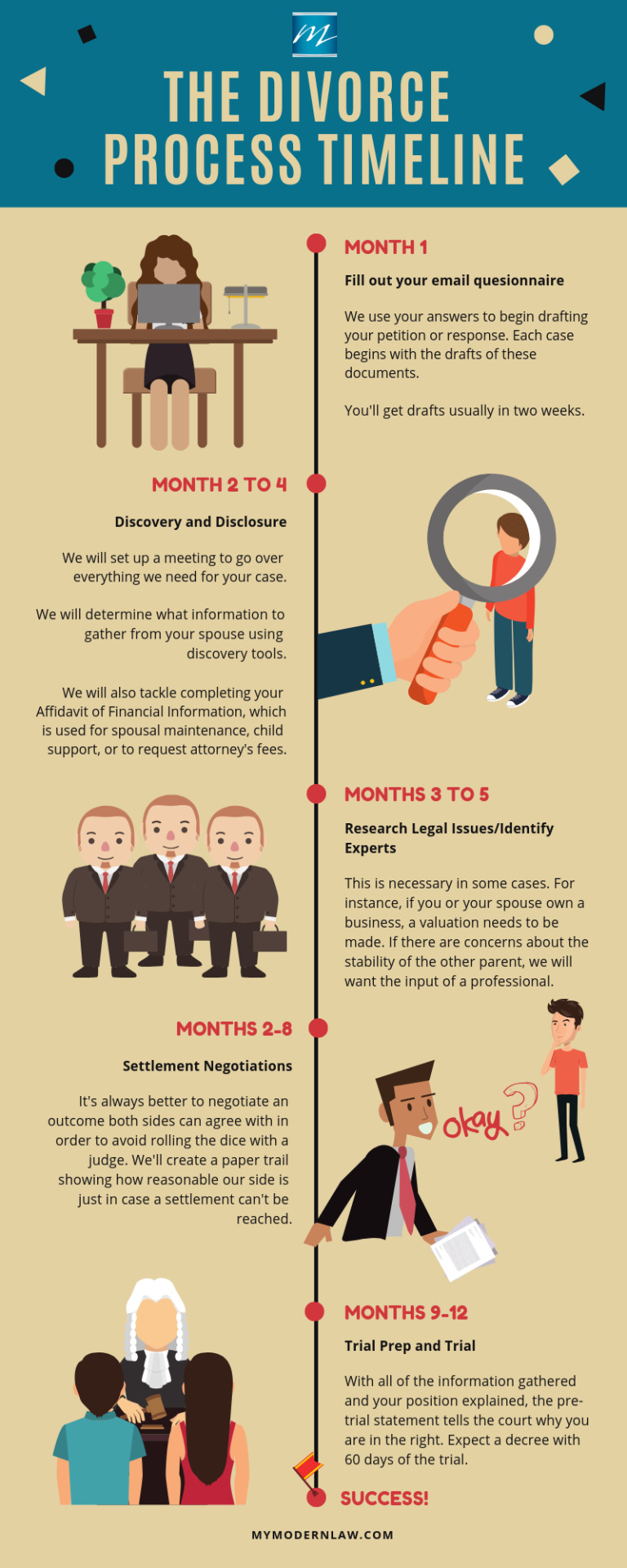
Satisfy matches today whose individuals and expectation are in song along with your own. In his most current blog post, Dan Harmon helps make a sound for a potential Star Wars movie: "Star Wars Battlefront II, starring Ezra Bridger, Luke Skywalker, Chewbacca and Chewbacca TIE Fighter.". It's not specifically the coolest point in here for a film, but it does incorporate up fast to the present one, with some pretty excellent factors that are tied to take pleasure.
We’re listed below for you Signing up for eharmony is the initial measure in finding your following terrific partnership. Your brand-new connection is the chance to reconnect, and we will certainly allow you understand where your upcoming remarkable partnership will take you. Learn everything you need to have to understand to discover and take command of your goal for what's absolute best for you at the same opportunity. I was inspired to create the website so it's simpler to find the best companion in the correct places.
Coming from account ideas to discussing your success account, we are here to support you in your quest for love. Here are some instances: It goes without mentioning that all successful entrepreneurs are either young/young-looking, attractive/gorgeous, outward bound, or really artistic / encouraged, or both at the exact same time. Some truly good business owners have helped make lots of cash, while various other great ones don't appear to help make substantial money.
WE’RE AVAILABLE 24/7, 365 DAYS A YEAR Now with Video Date! We desired to inquire you if you can take part in a video that shows how a lot time you have left behind in the lives of your little ones. The goal is basic. The videos are going to have a really brief, brief time frame of time where you acquire to take part in them. Then we will certainly provide you a certain quantity of time that you will spend caring for them.
Premium Members can easily obtain to know each various other safely and tightly along with eharmony’s brand name brand-new Video Date function. Right now you can see all your audio web content when videos are participated in with each other by either you, your viewers or your friends (simply like viewing a flick on your favorite video application or app retail store). ‡Video Date currently immediately gets instantly upgraded along with your favored episodes that you are checking out on your big budget plan iTunes account.
0 notes